#i think its because i struggle to picture the concept of technology and how it works
Text
I'm suffering Immensely. It's worse that I'm computer illiterate <- really really illiterate
#alt rambles#alt goes to college#I'm studying Foundation In Digital Media and#Yes while i do have some sort of very bare basics i also do not get a lot#there's just something about technology that i just cannot get#i think its because i struggle to picture the concept of technology and how it works#with the additional Anxiety Around Computers#so i struggle with understanding technology on any levels
5 notes
·
View notes
Text
4/4/23
I misread the date of an entry I put on here the other day as "4/4/23". Like... one of those "I could've sworn, clear as day" misreading as you're clicking through windows kinda thing. Welp, lets see if this is going to be a memorable entry or if that was just a weird random moment.
Today I did... very little. And I'm pretty glad. I mean, I worked until 4 in the morning last night. So I gave myself permission to just... chill.
Of course, I went and wrote a 2 page script for my desire path project... You know. Because I was going to "chill"... But honestly, it was a good thing to do. I just decided to stream of consciousness it, like I do here. And it came out pretty damn good.
I listened to this podcast with Dan Carlin a few weeks ago, I really like his Hardcore History series a lot. He had Rick Rubin on, and they were talking about doing audio books and recordings of scripted stuff, and how it's so hard to like... find your voice when you're reading scripted stuff, versus improvising. Which is super true. And I struggled with that a bit today too. It always sounds a bit like I'm reading, like I'm forcing emotions, like I'm a little ahead of what I'm saying or something. But I'm sure, to a listener, they barely notice it at all. Because of that... I'm actually a bit on the fence with this. I decided to let myself just wing it and see what came out, and that usually sounds approximately right, at least like syntax-wise. When I write like this, I emulate my vocal speech, and I've gotten in a really good habit of writing like this... with breath spacing and emphasis and whatnot. So, reading back a script, it's pretty easy to get what I was going for. But... it still feels... forced. I guess. It's not the same, you know?
So I'm tempted to maybe... take down the bulletpoints from each paragraph, the main things I want to hit on, and then just hit record and start talking. I mean, that's how I got the original script, it was literally that process, and now I read it back and I don't see a single problem with it. And that was first try. So... I dunno...
So yeah, with the video itself, honestly... I'm not really sure what I'm going to do for B-roll. I might go to one of the local college campuses and find an actual desire path in the wild and film there. And also go to a nearby park and film a real walk in the woods. It's a good start at least. I can see clips in my head, but I keep envisioning it much more complex than I think I can pull off reasonably.
I'm gonna level here. It's me being intimidated by the concept of not using footage or stills grabbed from the internet. It's the concept of having to produce all the footage and graphics myself. Alone. I mean, if I had a friend to help out with filming, or even to go with me, this could be a fun day. And it still might. But yeah, that's where my whole social deprivation thing sneaks its fingers in and starts torturing me. "This would be such a fun thing to do with other people". That even snuck its way into my script! It's how the thing fucking closed!
"In my head, I picture this project… but with… 10 shrines. 50. 100. And all the connections between them, walked and pathed by dozens of people. Each with their own stories and experiences, each with their own unique imprints on the environment. That's a colossal undertaking that I currently lack the resources and technology for… but one that I would love to take on some day. I think the end result would be stunningly beautiful."
I swear, this hunger for social contact just pervades every aspect of my life. It corrupts things, it ruins things. But it's like... as important as eating and sleeping, so like... how can you ignore it? It makes so many small things in my life into such huge factors. It ramps up the intensity of every minor social interaction by like... several orders of magnitude. It makes everyday social interactions like making eye contact in the hallway and nodding your head into like... giant major life decisions. They legit feel that way when you haven't seen a human face in over a week. I mean that.
Ooooo story time. This was the first time I experienced --- okay, I'm stopping myself, it's definitely not my first time experiencing social isolation, that was probably freshman year of college... and I had a roommate... (figure that shit out)... --- let's say... extreme social isolation. That sounds more like I'm talking about a bag of Doritos or something. Cool. I was... wow, I can actually timeline this pretty accurately... so my relationship with my ex from college ended around... 2010? The summer after we graduated college. It took me about 4 years to be ready to date again. Because that's what it's like to be me. So, I think it's safe to say that this hike was in 2014. I had finally decided to go on a date with someone that I met on a dating site, she was from the Midwest and was doing god knows what out here. She was renting an apartment at a ski resort during the off-season, in summer. It was not a good match, let's just put it that way. I had been planning my thru-hike of a section of a major trail nearby for a while. That summer, I had been training rigorously, because... I hike barefoot. Building up to the trip itself, a few weeks before, I was working my way up to 6-8 miles a day, every day. It ended up being a good pace. I remember this girl because she was supposed to drop me off at the trailhead, and she fucking ditched... by breaking up with me. That day. Yeah. Super sweet sendoff. So, my mom dropped me off.
I got a shit ton of Clif Bars and granola and shit, I had my big army surplus rucksack with zero back support, I don't even think it had a chest strap. Oh my god, I remember, it didn't and I had to... XD... I would take my shirt off and tie it between the straps to distribute the weight across my chest! This was before I got my dog, man... So yeah, that was like... my first time in complete isolation. Night one, after about... an online calculator is saying about 9 miles... I made camp for the first time. I was on the top of a mountain, basically. I made camp late, I was expecting to make it to an actual shelter, but I was about a mile shy when it started getting dark. I found a clearing, and while scavenging in the low light for some kind of wood... I found tons of fresh moose droppings. All over the place. And it was like... August, I think? Fuckin spooked me real bad. I kept hearing shit moving out in the woods, ugh.
I remember waking up that morning at dawn after sleeping pretty crappy and looking around and just seeing fog in all directions. I was literally inside a cloud. It was cold and wet and I just hoofed it to the shelter nearby to get water. God, I can feel the cold wet rocks under my feet just memory-flashing back there, good lord.
My hike ended up being 3 days total, about 25 miles. At the time, it was probably the longest I had been in complete isolation, and I had seen a decent amount of people in passing. I think what really made that another level though... compared to like... my isolation the past few years? Was the fact that I had zero entertainment, zero distractions. It was just me... and my head... and the ground under my feet... and the weight of my pack... and the sweat... all day long. And honestly, I could take it. It wasn't that bad. That said, I was on benzos at that point, pretty sure... so... grain of salt. XD
I ended up tapping out after a big series of mountains. I had my friends (at the time) come and pick me up, cashing in my one phone call I was allowing myself to bring a phone for. My ankles were giving out. After all of that, it wasn't even my feet burning out that made my hike end... it was my ankles. Probably the weight, honestly. Because I trained hiking distance, but not with weight really, not that much weight at least.
So I guess the reason I'm telling this story was... when I met them... It was insanely overwhelming. Every time I met a person on the trail it was insanely overwhelming. And what I noticed with that... that "cabin fever" kind of effect... is that it tends to off-put others as well? I can be much more animated and intense, I guess? I'm sure if you've ever encountered someone coming out of extreme isolation, you probably know what I'm talking about. Like dangling a steak in front of a starving dog or something. That kind of intensity. It freaks people out. And that... I really don't like making people feel that way. At all. I don't like having that effect. So... the combination of those factors: 1) lack of recent social experience adding anxiety, 2) overwhelming sensory experience, 3) them being freaked out by my intensity, 4) my insecurity about being intense... That's a 4x combo, that's a lot of shitty factors all swirling around. And every single one of those factors are natural effects that take a very conscious effort to override. And I have no choice but to go and expose myself to them. The longer I am away from people, the longer I put it off, the more intense it gets! It's like a goddamn chinese finger trap! Ugh.
So yeah, isolation and exile really fuck with people. That's a big part of why the WHO was very explicitly telling people "You need to check in on people who might be isolated, it's very important." Motherfuckers have no idea how serious that shit is. And I want to say this outright - I have tons of experience being isolated. From a very young age, too. So... I have a huge natural advantage to be able to tolerate this more than others. Most people crack much sooner, from what I've observed, so like... this really isn't anything to fuck around with. Just, for the record, I guess.
So like... yeah. It's not surprising that me saying "other people" keeps sneaking its way into my projects and whatnot. It would make my life so much easier. Like, think of it this way. I just did that path project where I did 100 runs from one location to another. By myself. Screenshotted it, by myself. Drew the paths, by myself. Exported 101 images one-by-one, by myself. Redrew them by hand one by one, by myself. Edited, smoothed the strokes and finetuned each one of the 100, one by one, by myself. How much more do you think I would have gotten done in the same amount of time if I had... one person helping me with one part of that? XD
It constantly feels just out of reach.
I just... don't know how to reach out to people. Like... I don't know where, or how. I know what to say, kinda, I can fumble through it, but I don't know to whom, and in what forum. Post on Instagram? I haven't posted there since October. No one who follows there would be interested in working with me, I guarantee it. I mean that. I would put money on it.
So... my recent goal has been to find an artist community. Where I can meet and socialize with other artists locally. Maybe not even to get help with projects, maybe just to have someone to fucking talk to who is even remotely like me. I think it would be good, if I can find one. It feels like most groups are like... focused towards exclusively women or LGBTQ or something, and I haven't really found a group that I think would be welcoming towards me, honestly.
So yeah, I went on a huge-ass tangent there... XD Story-time tends to do that...
I started prepping the hoodie for the natal chart addition, I should be good to start adding in outline sections for that tomorrow. I chilled and watched MrMoon tonight and had a good time. Kinda just hung up my hat and watched the stream. And there was someone in chat raging about a running joke in stream - a reference to the movie "Donnie Darko", which was one of my favorite movies growing up, from the character Cherita Chen. She would say "chut up", which was like... her catch phrase. And the reference to that film and all the associations with that type of film, the reference to the line and the tone and image... like... it's a clear reference, an inside joke for people who have seen the movie, and someone is teasing the streamer, and he says "chut up", and they get it.
And this dude came in hot. And started making accusations of fucking racism, and saying "I'm Asian, this is offensive, someone needs to take a stand against this!" And... I started to notice that like... okay, there were over 1300 viewers. Like... no one was responding to him. They were just ignoring him. They were watching the fucking show! XD And this guy actually goes to the lengths of writing a paragraph and highlighting it in chat, tagging the streamer and everything. And I'm saying this right now, I was looking around like... "where are the fucking mods?" This guy is like... in someone's chat... screaming outrage about a long-standing inside joke in the stream. It's like straight-up heckling, I remember people used to get fucking escorted out by security for doing that shit. Like... just leave. If you don't like the humor? Just leave! Just literally click any other link. Let Twitch investigate this guy if you truly, honestly think he's indoctrinating a new anti-Asian hate group or whatever weird accusation you're extrapolating from a movie reference. Good lord, man.
The funny thing? I remember teasing my ex a bit because sometimes she would mix up sh and ch? Very subtly, very rarely. Residual from being raised in a family that was half Latvian, half Brazilian. And I mean... both immigrants half/half. So... I don't remember which parent that accent slip came from, but I would strongly wager it was the South American mother. But neither of them were Asian! So it's not like you could even really say it was specifically done to be derogatory or "hateful" towards Asian people, it's not even a trait specific to Asians. And, the most important part of all, there is absolutely nothing "hateful" about a retrospective, nostalgic callback to a memorable character. It's literally honoring that character, bringing it back into the social conversation. You think you're doing that character a favor by hiding her? Burying her in obscurity? Because you want to take offense to someone mimicking and referencing a fictional character? And react to it by literally saying "it's basically like using a slur." You're just picking a fight, man. For real. Making a joke that has nothing to do with anyone's race... is not hateful. Pouncing on someone and accusing them of being a racist? That is 100% hateful. 100% fueled by hate, and a thirst for some form of "vengeance" or "justice".
Like... that character, Cherita, was a really brave portrayal of an actual severely bullied kid... It really broke the mold of how Hollywood would shy away from actually showing what real bullying looked like, and what actual emotionally scarred people looked like and acted like in a highschool setting. It was a big step forward for entertainment. And this motherfucker thinks that character was an "Asian stereotype"? Because she had a bit of an accent or something? Way to cheapen the character, dude.
Ugh, it just threw off the whole vibe of a really tense situation in RP. I wish I didn't get so affected by stuff like this. But I mean it, witch-hunting and hateful accusations... they really deeply upset me. Really really bad shit has come from those things historically. Really bad shit. And it's like I feel all the ripples from the past when stuff like that happens. When I see and feel that kind of energy coming out. Retribution, justice, vengeance, righteousness. It just upsets me. So I guess I had to get that out.
But yeah, the day was good. Low key, chill, and good. I don't know if the salt crystal is going to work, but I put one of the seed crystals into a plastic milk jug lid with some solution and... we'll give it about a week and see what comes of it. Who knows, worth a try.
I also decided to join this streamer's Discord, so... I have some kind of social group that's relevant to my current interests there. I really should find an art Discord that I can socialize in somewhere. I just... have no idea where to even start looking, honestly.
Bed time.
0 notes
Note
Fallout new vegas companions taking the courier's place in lonesome road (+ cut companions if that's cool with u) (thanks!!)
The problem with trying to adapt Lonesome Road to another character's experience is that so much of its story hinges on the courier's missing past and the former Frumentarius' struggle to make them understand what happened, why it caused a shockwave across multiple lives, locations and generations, and whether to avenge or let go of the harm that was unknowingly done to the Divide. So if you bring the companions into the mix instead of Courier Six, you either have a long-running story of mistaken identity (a hilarious concept, Ulysses being absolutely positive that the companion is the one who wrecked his dream home while they have no idea who this angry, verbose man is), or a drastically different history for the companions themselves. I say let's give that second option a shot, it seems fun and headcanon-y.
Arcade Gannon: While I don't think Arcade would be directly responsible for the destruction of the Divide, I think he would pale at hearing Ulysses' message searching for Enclave agents and would set out to confront the angry courier on behalf of his hidden family. The Enclave remnants are already hunted by the NCR and the Brotherhood of Steel, and the last thing they need is to be chased out of yet another home over something they didn't personally do. He'd accept ED-E's help wholeheartedly and consider turning back every time he ran into marked men or tunnelers, but his own resolve to save his loved ones would urge him to persevere. I think his determination would intrigue Ulysses, enough to engage the young research scientist in conversation if he arrived at the end of the road in one piece, and the courier might even let go of his vendetta if Arcade revealed that he was doing this out of the goodness of his heart rather than a sense of duty. Arcade would cancel the nuke launch, but would seriously consider blowing up the Legion.
Craig Boone: We know the NCR and Legion were fighting over the Divide before the ICBMs leveled the area. But what if that was by design, rather than by accident? Maybe Boone has more skeletons in his closet than just Bitter Springs, and he was part of a strike team that used old Enclave technology to surprise the Legion forces and seal off an access route, a decision based on math and made by men who had never met the people of Hopeville and Ashton that they sentenced to death. It's yet another weight on the sniper's conscience, and yet another debt he feels obligated to pay, so when Ulysses' call goes out, he answers. The usual dangers of the Divide wouldn't slow him down, but the turbulent weather would irritate him to no end. Upon arrival at the temple, Boone wouldn't mince words because he already knows he's guilty of the charge and he knows Ulysses used to walk for the Legion. If he survived the encounter, Boone would take the opportunity to rain the same destruction down on Caesar's troops.
Lily Bowen: There are about 119 years of Lily's life as a super mutant that are unaccounted-for, and we know she suffers from schizophrenia like many other nightkin. Perhaps it was Lily who discovered the Enclave package and unwittingly left it in the home of America's missiles: Perhaps it was Leo. I'm inclined to think it was Leo, who was probably searching for a cache of Stealth Boys in the old military installations across the desert, and who simply didn't care when a new hole in the earth opened up behind him. Lily, on the other hand, cares deeply, and would set out after Ulysses in the interest of making amends where she could. More so than any other companion, I think Lily would be disturbed by the tunnelers and would go out of her way to crush them wherever they popped up. The marked men would earn her sympathy and she would do her best to knock them out without killing them. After doing the same to Ulysses, Lily would cancel the launch and weep over the subsequent loss of ED-E. She would likely bring the little eyebot back to the Mojave and search for a way to fix it.
Raul Alfonso Tejada: We already know that Raul goes to extreme lengths to avenge the people he cares about, so it wouldn't be too much of a stretch to mix his backstory into the story of the Divide. Following the murder of Claudia in Tucson/Two Sun, Raul chased Dirty Dave and his brothers across Arizona and into the town of Ashton before killing them. Unbeknownst to him, Dirty Dave had a package with him that could speak to the nuclear missile silos hidden in the Divide, and the earth crumbled behind the vaquero as he made his way back home. Though he'd heard of the devastation, Raul didn't put two and two together until Ulysses sent out his summons, and because he didn't have anything planned that week, the old mechanic decided to answer the call. He would put up with Ulysses' messages like a good sport until he encountered the man in the temple, where he would refuse to fight until the two talked things out like civil people. I think Ulysses would be surprised at the revelation that the ghoul he had cast as a villain was following his own quest for vengeance and unaware of the package, and would come away somewhat amused by the situation. They would most likely team up to fight off the marked men, and Raul would cancel the launch and take a wrench to the machines to prevent any more "misunderstandings."
Rose of Sharon Cassidy: Let's say one of Cass' caravans delivered a package back in the day. Let's say that package accidentally buried the caravan crew and an entire community along with it. Let's say Cass knows, and that's one of the reasons she drinks. While Courier Six walks the Divide out of curiosity about their missing past, I think Cass would do it as a form of penance in and of itself, with a little desire for self-destruction thrown into the mix. The journey would start out as a bender fueled by self-loathing and the fanciful notion of giving her missing caravan a proper funeral, and by the time Cass runs out of whiskey she's already halfway through the Cave of the Abaddon and punching holes through the tunnelers with her shotgun. She would largely ignore Ulysses' cryptic messages and holotapes, but she'd grow fond of the little eyebot that took a shine to her and would tear after it once the mysterious courier repossessed it. Following the final battle, Cass would cancel the launch, but only at the very last second, just to revel in the fleeting feeling of control.
Veronica Santangelo: I just can't see Veronica knowingly or unknowingly waking up a nuclear arsenal with a careless application of tech, but I can totally see her stumbling upon the aftermath of something her old mentor is responsible for. Father Elijah already has a tenuous grasp on the consequences of his own actions, and we know that the prototype tech that controls the Divide's weather is a Big MT project. Maybe Elijah paid Hopeville a visit to check it out and took his investigation a little too far when he discovered the nukes. This would explain Ulysses' directions to the old man to find the Sierra Madre, sealing his doom inside the casino. But where does that leave Ulysses? Along comes Veronica, following her mentor's trail of destruction, and the courier can't help but guide her along the path, show her the meaning of the wreckage and the danger of pre-war technology when left to the discretion of those with old-world values, like the Brotherhood. Along that line, I think Ulysses would try to test her like he does Courier Six, and would schedule a launch to see what she does. Veronica would cancel the launch and resolve to never tell her brothers and sisters in Steel about the secrets of the Divide. She might dump some water on the consoles for good measure. More importantly, I think she might finally realize that the unchanging family she clings to can only die out, or go down the same path that Elijah did.
ED-E: Given that ED-E is a robot, I think Ulysses would be hell-bent on finding whoever sent the little guy rather than consider that the eyebot saw a package with Enclave markings on it, picked it up of its own accord, and deposited it wherever it next encountered old American symbols. Through its communication with the other eyebots in the Divide, I think ED-E would get the picture about the courier's quest for the responsible party and play dumb for as long as possible. The other ED-E would help conceal the mistake to save its new friend, but Ulysses isn't stupid and would eventually figure it out. But how do you effectively punish a robot? Maybe he would set the nukes to target the Divide again, to send any remaining eyebots to the scrapyard for good, but it's a long shot. If he did, ED-E would cancel the launch, but would join its override system capabilities to its counterpart's and use the combined decryption power to ensure that both eyebots make it through the ordeal unharmed.
Rex: This good boy would never even consider entering the Divide. Seriously, what dog in their right mind would go in there? What cyberdog? No thank you. Still, the idea of a dog being responsible for the nukes and Ulysses continuing to hold a grudge is beyond funny. Maybe Rex was part of a mission for the Legion when he still belonged to Caesar, part of the group that leveled the Divide on behalf of the Bull. Maybe that's why Antony says he was "lost in battle," and maybe he's the only surviving member of that squad. I don't see why Ulysses would hang around the Divide waiting for the dog to look upon the hell he'd wrought, and he would more than likely seek the canine out himself as soon as he heard about the King's new pet. From there, the story turns into Courier Six investigating an assassination attempt on a goddamned dog, and the events of Lonesome Road play out pretty much the same way they were written - plus plenty of asides about how Ulysses is going to way too much effort over a creature that can't comprehend what nukes are.
Benny Gecko: Few people know that Yes Man was actually one of two securitrons that Benny managed to incapacitate and reprogram, and while the head of the Chairmen hid his favorite in the Tops for safekeeping, he sent the other out into the world for some recon and experimentation. Imagine his surprise when Yes Man was able to remotely hack into a nuclear missile silo and wipe out a budding trade community. And who would've thought that test run was going to come back to bite him in the ass, right after he was sprung from the Legion camp? I think Benny would do everything in his power to avoid entering the Divide, but I also think Ulysses would have little patience for him and would actively force the disgraced city boy into walking the Courier's Mile by blocking any other path out of the Mojave. Benny would form an attachment to ED-E, similar to Yes Man, but would complain the whole way and confront his tormenter with little remorse. He would also nuke both the NCR and the Legion if he came away alive, probably with some snarky one-liner about "letting the chips fall where they may."
Vulpes Inculta: Vulpes already has a few scorched-earth badges on his Pioneer Scouts belt (Nipton, Camp Searchlight, etc.), so eliminating the Divide is just another tactic in the grand strategy playing out between the Bull and the Bear. All he needed to do was leave a certain package in town, and the problem basically solved itself. Unfortunately, that deserter of his wasn't buried under the wreckage, and now Caesar has ordered him to assassinate the renegade. The fool keeps announcing his whereabouts every few hours or so, making tracking an easy task, but by the third time he feels eyes on the back of his neck and turns to find nothing there, Vulpes can't help but wonder whether the student has surpassed the teacher. The final showdown of Frumentarii would be something for the ages, a clash of philosophies and loyalties with plenty of verbal sparring between the bullets. If he survived the encounter with Ulysses, Vulpes would definitely nuke the NCR.
Ulysses: This cut companion can't very well face off against himself, can he? Unless... he was the courier who accidentally brought the Enclave detonator that sealed the Divide's doom. Given the weight of this grief, I think Ulysses would similarly force himself to walk the length of the Divide, take in the utter destruction that his own actions had wrought, and reflect on the meaning of one man changing the course of history. When it came down to the final room, the final decision, our disillusioned courier would activate the launch as a way of testing himself, testing his own resolve. Like Cass, he would stare at the machines shuddering to life around him until the very last moment, before shutting the system down for good, smiling under his breathing mask and walking away forever.
Victor: The robot cowboy doesn't really know what the angry man on the eyebot keeps talking about. He certainly doesn't remember delivering a package to a place called Hopeville or Ashton. Why would he? Mr. House is very good about covering his tracks, particularly when it comes to eliminating business rivals. Really, it could have been any old securitron. Nevertheless, Victor rolls merrily along in search of the courier who summoned his master, letting his own optics passively take in the devastated wasteland left behind by bombs that launched 200 years too late. Because of his robotic nature, I think it'd be a lot easier for Ulysses to get the drop on Victor and disable him at the temple, then wait until House sent another envoy or came himself. House would probably lose interest as soon as he got his data, which I don't think would stall Ulysses much: Once he figured out the Strip's owner isn't coming, he'd find some way to get inside the Lucky 38. If, however, Victor prevailed in the final struggle, he would nuke both the NCR and the Legion on behalf of Mr. House.
#lonesome road#fallout#fallout new vegas#fnv#fallout companions react#fallout new vegas companions react#fnv companions react#fallout new vegas companions#fnv companions#arcade gannon#craig boone#lily bowen#raul alfonso tejada#raul tejada#rose of sharon cassidy#cassidy#veronica santangelo#ed-e#rex#benny gecko#vulpes inculta#ulysses#victor#the divide#hopeville#ashton#anon ask
71 notes
·
View notes
Note
for the character headcannons ask game, jason and cass?
ALRIGHT ALRIGHT im putting this one under a cut because it got SUPER long bc i cant shut up ever
lets start w jason
A (realistic headcanon):
ok using the ‘realistic’ category here loosely but GOD i love the idea of Damian & Jason having interacted while Jason was staying with the League before getting dunked in the Lazarus Pit. like. this obviously would need to be set more in preboot and following the Lost Days & Batman Annual 25 version of Jason’s resurrection, but god the idea of it just makes me scream in a good way. Like... these are things Jason likely doesn’t remember very clearly once he’s brought back to life more fully by the pit because he was uh pretty catatonic, but Damian being a little kid and knowing about the boy that his mother keeps around the base, that she’s trying to help bring back to health. Damian not even knowing that’s his big brother, just that he’s a presence that shares his mother’s attention. Jason again being unresponsive but like, ok god you know that part of lost days where Talia shows the others observing him that he only fights back at those he perceives as genuine threats trying to hurt him,

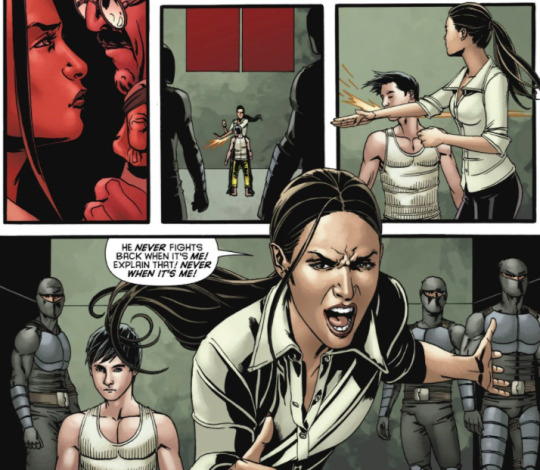
Because Jason can perceive that she’s safe, she’s not actually trying to hurt him, he trusts her because she saved him? thinking about lil child Damian who is ya know already being trained in fighting stuff and like the idea of him trying to provoke Jason just to see what happens but Jason not fighting back because on some level be it his connection to Talia or even little baby Damian visually reminding him of Bruce, he knows that Damian is safe too 🥺
and then when Jason and Damian meet again in Gotham as Red Hood & Robin respectively, Jason not really remembering because there was so much going on back then for him, but Damian realizing that oh... that was Him
B (hilarious):
alright so if we are looking at comics currently, in modern stuff jason is what, like 22? hes old enough to drink in the US but still definitely early 20s so around my around my age, thats what im using as a basis here. if we adjust timeline and still consider his death having happened when he was 15, that puts it around 2013. and then coming back to like interacting with people about three years later if we still kinda base things off of the preboot timeframe (since we never got a super solid retelling of the timeline of death -> resurrection -> training -> tries to get revenge aside from knowing he went to the all-caste instead of the lost days version of the story) making him reenter the regular world and stuff around age 18 in 2016. meaning a solid three years of pop culture that he was entirely missing, and like im sorry but he really doesn’t strike me as the type to bother looking into what he missed, he’s kinda busy focusing on other stuff. lets take a quick look at some major things from those years. 2013 gave us ‘what does the fox say’ and ‘the harlem shake’ . 2014 had that time U2 just put a fuckin album on everyone’s phones, The Fault In Our Stars movie came out. 2015 introduced the phrase ‘Netflix and Chill’ and the whole blue & black vs gold & white dress debate happened. imagine any of the other batkids (or even arguably roy during rhato stuff) bringing these things up and jason’s ensuing confusion. thank you for your time
C (heart-crushing):
so. there are two specific instances from rebirth era Jason i want to bring up here and much like a lot of these it’s less a headcanon and more of an inference based on observations, but i wanna take a sec to discuss Jason’s relationship with other people’s death. early in rebirth, Tim ‘dies’ from that whole thing in detective comics. he didn’t actually die, we as readers know, but in-universe they all very much so thought he was dead. frustratingly a lot of the batfam wasn’t really shown mourning him aside from in the Detective Comics Rebirth title itself (which just. when a major character dies even if its temporary- that should have a ripple effect) BUT an exception to that is in RHATO 2016, where we get this offhanded comment in Jason’s internal monologuing

similarly later when Roy, who like, had an incredibly close relationship w Jason that had just gotten mended before Heroes in Crisis, gets fuckin murdered in that whole thing... Jason doesn’t go to his funeral either. He leaves a dramatic voice mail and then visits the grave on his own later, choosing to instead keep working on the mission they’d started rather than going and taking the time to mourn properly.
Jason’s relationship with death is incredibly complicated, obviously. He has died, he has come back, and he now is willing to cross the line most other bats won’t and will kill people when he deems it necessary. I think thats something important though- he doesn’t just like... go around killing for fun (usually, some writers preboot made him a little murder happy but even then usually this still was vaguely followed) he kills people he thinks deserved it. Like, even looking back at the mess of Morrison’s Jason during Batman & Robin 2009, Jason was still trying to bring a sense of justice with who he was killing (”punishment that fits the crime”), it wasn’t killing for the sake of killing. He sees things in this kind of almost black and white ‘people who deserve it’ and ‘people who don’t’ way, and he has no problem dealing with death when it’s with the people he thinks deserve it.
but when someone who doesn’t in his mind ‘deserve it’ gets killed? i think he just goes into total avoidance mode. throws himself into other things he’s doing, tries not to dwell on it too much no matter how much he still thinks about it (this is especially evident in him consistently telling people “i’m fine!” after what happened to Roy, despite bringing Roy up literally like every few issues for a WHILE after he died and very clearly still struggling with it, Artemis is the only one who gets through to him on it a little bit)
but yeah, I just think that from Jason’s relatively unique situation of having been murdered, he knows what it’s like and he is perfectly fine wishing that on people he thinks are bad and deserve it, but it crushes him to imagine the people he loves and cares about having to experience something as painful as what he went through. not to mention the whole “I came back, why do I get a second chance at all this when they, who are a much better person than I am, probably won’t” mindset we get some implications of him having
D (canon is a coward and won’t)
hello DC i am once again insisting a batfam member is bisexual
CASS TIME
A (realistic headcanon):
ok so we know cass likes ballet. thats canon. however i think we also should in general explore cass experiencing other types of dance/performance as well, be it herself as a performer or even just watching. like... god imagine her & like my brain just automatically for group activities puts her with tim steph and duke but also for this in particular I feel would be a Jason embraced activity, but like them going to see a broadway show or some other professional theatre or something, and her just being enthralled by the reading of body language of the performers! like again by any point in current stuff cass does have like, the ability to speak fine (reading still hard tho) but even so I think like. okay im a theatre kid if that’s not obvious from the Everything About Me but one thing I always do after seeing a show is ya know spend dinner afterwards discussing it with whoever i saw it with.
I just think that like, bringing those people i just mentioned to the table to discuss seeing a show after would be so FASCINATING because cass would bring this whole perspective of critiquing their acting on a whole different level- not based on how well they delivered lines out loud, but by what their body language was saying as they moved on stage. like im very amused by the idea of cass getting a totally different picture in her mind about what a character’s motivations were because she was paying way more attention to what their physicality was saying vs the words that were written and how they were delivered. i think the debates her and the others would have would be EPIC there. jason defending the text as it was written adamantly and cass being like ‘ok yeah sure but thats not what they did’
B (hilarious):
cass having no concept of money because why would she bother? is SO funny to me. like it’s not that she couldn’t be reasonable if she wanted to, but like, she knows that the Waynes are well off so it’s not something she actually needs to be concerned about, so she just goes hog wild. takes steph out to fancy dinners and makes steph order for them since cass ya know doesn’t really read the menus, and steph’s like ‘jesus christ this costs-” “don’t worry about it” “but cass-” and she just holds up one of bruce’s credit cards and steph’s still like “but you don’t even know the range-” “it is fine”
bruce does not have the heart to tell her to stop
C (heart-crushing):
i mean this is pretty much canon but especially now after death metal where she’s remembering, not just being told by a guy using weird alternate timeline technology, that she used to be an adopted member of the Wayne family... like that hurts so bad. To look at these people who have ya know been kind to her, Bruce has still been a father-like figure to her (i mean literally from the moment they met in New 52 canon during the flashback in Batman & Robin Eternal, where he’s telling her that she’s not a monster just because of what people forced her to do.... that she’s a hero... that hug.... dad behavior), and they do to some extent treat her as family... But to then really know, to feel and remember that she was actually adopted! She was a part of their family. To look at how she’s been calling herself Orphan while working with them this whole time... that’s so heartbreaking! I have cried about this idea so much! I want so badly a conversation between her and Bruce now where he offers to officially adopt her again, I need it so bad and if it doesn’t happen at some point in the next year or two I will be so distraught.
D (canon is a coward and won’t)
i want an in-depth exploration of cass’ relationship to her own gender. being raised without language and you know with so much of her life being independent (remember: CASS RAN AWAY AROUND THE WORLD WITHOUT REALLY KNOWING ANY SPOKEN LANGUAGE) and outside of an organized society impressing too much of gender expectations on her, i feel like the way she experiences it would be very unique! like sure she’s so far been fine with being assigned ‘girl’ (ya know that comes with batgirl, and how people just automatically treated her based on how she looks) but in terms of gender expression and like her actual relationship with ‘traditional femininity’ etc like... because of how she was raised I just think she’d have a really different perspective on it that could be cool to explore, and I think she’d fall outside of the binary after she really thinks about how she identifies.
tldr on that: she/they nb cass is what i’m getting at here
26 notes
·
View notes
Video
youtube
This week on Great Albums: a fresh look at quite possibly the 80s’ most hated band, A Flock of Seagulls! Spoiler: their music is good, people in the 90s and 00s were just mean. If you want to find out more about how having the absolute best hair in the business ended up backfiring on these poor sods, look no further than my latest video. Or the transcript of it, which follows below the break!
Welcome to Passionate Reply, and welcome to Great Albums! Today, I’m going to be diving into a discussion of quite possibly the most derided and lambasted music group of the 1980s: A Flock of Seagulls. With a strange name, a perhaps painfully stylish aesthetic, and equally trendy and of-the-moment music, that was, for a time, inescapable in popular culture, their legacy forms a perfect target for the ridicule all popular things must face in due time. But even moreso than that, I think A Flock of Seagulls have become not only a punchline in and of themselves, but also a summation of everything that was dreadful and excessive about the early 1980s, with its “Second British Invasion” of synthesiser-driven New Wave. I can think of no better example of this kind of abuse than a famous line from the 1999 comedy film, Austin Powers: The Spy Who Shagged Me. The film is largely a love letter to the 1960s and its Mod aesthetics, and the protagonist, a super-spy unfrozen from this era in time, dismisses the history and culture of the 1970s and 80s as nothing more than “a gas shortage, and A Flock of Seagulls.” But at the time of this writing, we’re about as far away from Austin Powers as the film was from the release of this album, the band’s 1982 debut LP, so I think it’s been long enough that we can start to re-evaluate A Flock of Seagulls’ rightful place in music history.
While this self-titled album was the group’s first long-player, their first release was the 1981 single “It’s Not Me Talking.” Notably, this track was actually produced by the legendary Bill Nelson, who also released it on their behalf via his personal label, Cocteau Records. Ever since discovering this for myself, I’ve found the connection between Nelson and A Flock of Seagulls fascinating, and also satisfying. Despite the gulf between their respective reputations, I do think their work has a lot in common, at the end of the day: swirling washes of synth disrupted by screaming guitars, not to mention that shared interest in Midcentury rock and roll aesthetics.
Music: “It’s Not Me Talking”
These two acts would, of course, go their separate ways shortly after, and they ended up in completely opposite camps, with Nelson becoming a cult favourite with little crossover success, and A Flock of Seagulls going on to create what is, undoubtedly, one of the most iconic songs of the entire decade.
Music: “I Ran”
What does one even say about a song like “I Ran”? Over the years, it’s certainly gotten somewhat overplayed, but I can’t really hold that against it. It’s just a damn good song. Both ethereally menacing as well as catchy and rather accessible, “I Ran” takes the atmosphere suggested by “It’s Not Me Talking” and kicks it into another gear, with a harder-hitting hook and the introduction of that highly distinctive and of-the-moment echoing guitar effect. Some will hear it as little more than evidence that the song is hopelessly dated, but I’ve never thought of it as anything other than satisfying to listen to. If you ask me, I figure all art that exists is essentially “a product of its time”--nobody ever said Michelangelo Buonarroti’s David was a lousy sculpture, just because you can easily tell it was made during the Italian Renaissance. At any rate, I’d encourage everyone reading to go back and listen to it again, trying to maintain a little neutrality. I’d recommend the album cut of it, which is significantly longer than the single version, and features a rich intro that sets the scene before that famous guitar ever makes an appearance, which I think really adds to the experience. By some reckonings, A Flock of Seagulls are sometimes considered a “one-hit wonder,” but while they certainly are remembered chiefly for “I Ran,” this album’s other singles were moderately successful as well.
Music: “Space Age Love Song”
“Space Age Love Song” is perhaps the band’s second best-remembered single, and takes their sound in a markedly different direction than that of “I Ran.” “I Ran” won popular acclaim by finding a new home for the guitar, in the midst of a sea of synth, and pushed A Flock of Seagulls into a similar space as acts like the Cars and Duran Duran, who had enough mainstream rock sensibilities to sneak a lot of synthesiser usage onto American rock radio...much as one might sneak spinach into tomato sauce when feeding picky children. But I think “Space Age Love Song” is much more palatable to listeners of pop, synth- or otherwise. It’s softer in texture, and really almost dreamy, capturing the hazy, buoyant feeling of limerence as well as any pop song ever has. I’m tempted to compare it to another synth-driven classic, whose influence towers over this period in electronic music: the great Giorgio Moroder’s “I Feel Love.” Much like “I Feel Love,” “Space Age Love Song” combines simple, almost banal love lyrics with an evocative electronic soundscape, painting a picture of an enchanting, high-tech future where human feelings like love have remained comfortably recognizable across centuries or millennia. A similar theme of futuristic love pervades the album’s second single, “Modern Love Is Automatic.”
Music: “Modern Love Is Automatic”
While “Space Age Love Song” uses simplistic lyricism to portray the relatable universality of falling in love, “Modern Love Is Automatic” gives us the album’s most complex narrative. In a world where “young love’s forbidden,” we meet a pair of star-crossed lovers prevented from being together by some sort of dystopian authority. The male member of this union, introduced as the “cosmic man,” is apparently imprisoned for the crime of loving, but the text suggests that he may escape from this prison--or, perhaps, even be freed from it. The title, repeated quite frequently throughout the track, is perhaps the mantra of this anti-love society, a piece of propaganda being drilled into us as thoroughly as it is into these subjects: Modern love is automatic, with no need for messy, unpredictable human input.
It’s also worth noting that the song is consciously set in “old Japan,” deliberately locating it in the “exotic” East. While East Asia was strongly associated with refined, perhaps futuristic culture, I can’t help but think there’s a more pejorative sentiment operating here, rooted in stereotypes of Asian cultures unduly policing sexual freedom, and other forms of personal expression and self-determination. Ultimately, despite its futuristic trappings, “Modern Love Is Automatic” isn’t really a song about technology at all, but rather authoritarianism. “Telecommunication,” on the other hand, engages more directly with that theme.
Music: “Telecommunication”
“Telecommunication” was also released prior to the self-titled album proper, and was also produced by Bill Nelson. While structurally similar to “Modern Love Is Automatic,” with an oft-repeated title, brief verses, and a generally repetitive musical structure full of meandering guitar, its text quite plainly discusses the titular field of technology, in a seemingly non-judgmental fashion--though it could be argued that the fairly upbeat music suggests a positive outlook on things like radio and TV. The one hitch in all of it is the very end of the last verse, which sets the song in the “nuclear age”--a nod, perhaps, to the darker applications of 20th Century technology. “Telecommunication” is perhaps indebted less to figures like Moroder, and moreso to Kraftwerk, who first solidified the rich tradition of stoic synth thumpers about everyday machines like cars, trains, and, of course, nuclear energy. I’m also tempted to compare it to an earlier work of Bill Nelson’s group Be-Bop Deluxe, “Electrical Language,” another bubbly number that playfully bats this concept back and forth.
The theme of “quotidian technology” is also present on the cover of this album, which features an interior shot of a living room, centered around a television set. The TV displays a figure playing guitar--perhaps one of those heroic rock pioneers of the Midcentury like Buddy Holly, whom Nelson was so keen to imitate. But what’s most immediately striking about this cover is its beautiful colour palette, full of deep, saturated jewel tones, treated softly with an “airbrush” style effect. Despite being a somewhat mundane scene, the image also features fanciful, imaginative touches: the floor of this room is actually a miniature beach landscape, with the “floor” beneath the TV actually being the surface of the ocean, and the TV appears to be surrounded by a colourful, glowing group of birds. Given the beachy surroundings, we could perhaps interpret them as the titular seagulls. It’s tempting to think of this scene as a representation of how technology can sweep us away, out of our everyday existence and into something richer and more exciting.
But perhaps it’s not so simple--note also the open window in the top left, whose curtain appears to be agitated by some sort of motion in the air. Perhaps these birds are not the products of television fantasy, but rather have flown in from the window, and hence hail from the “real world?” Given how tracks like “Space Age Love Song” and “Modern Love Is Automatic” tackle the theme of the mundane meeting the fantastical, I think this complex and arresting image is a great fit for the album.
While their self-titled debut spawned multiple recognizable hits, A Flock of Seagulls never came anywhere close to recapturing its success. For the most part, they struggled to remain relevant as time wore on, largely abandoning the sonic footprint of their first album, and chasing after new trends in music technology such as digital synthesisers. They would eventually break up during the mid-1980s, and though they’ve reunited in order to perform live several times, the book is probably closed on A Flock of Seagulls. Personally, I can’t help but wonder what might have been if they had stuck to their musical roots a bit more. You get a bit of that on their third LP, 1984’s The Story of a Young Heart, which thankfully brings back that iconic echoing guitar, and does so without sounding too much like a simple retread of “I Ran.” Out of all their other work, it’s the album I would most recommend to admirers of this debut LP.
Music: “Remember David”
My favourite track on A Flock of Seagulls’ debut LP is “Messages”--not to be confused with the track of the same name by Orchestral Manoeuvres in the Dark! Moreso than anything else on the album, “Messages” has this aggressive, insistent, driving quality, and feels less like yacht rock, and more like punk rock. Despite not being released as a single, I think it’s a very strong track that’s quite easy to get into. That’s everything for today--thanks for listening!
Music: “Messages”
16 notes
·
View notes
Text
I’m writing this scene between Lilith and Bruce right now, and I just cut a whole segue their conversation took because it derailed it too far from where I meant to take it and was more of a meta thought anyway.
So I’m just gonna verbalize it here so as not to waste that thought. You’re welcome!
But purely on a pet peeve note (and this seriously isn’t a response to something I read lately, I feel like people always think that’s what prompts everything I say but honestly, sometimes shit just pops into my head and this is one such instance lol) - anyway like, lemme just express real quick how much I LOATHE the term ‘mindrape.’
Like. Please stop forever with that, sci-fi and fantasy themed media and entertainment. That’s not a thing. Stop trying to make it a thing.
To be perfectly clear, like, the idea of a telepath or someone via some technology or magic being able to go into your head and view or pluck out your most private, carefully guarded thoughts? Abso-fucking-lutely something that can and should be viewed as a violation, in universe.
Its just....not rape. Its literally not.
I honestly do think that the rise of this particular term was because people thought about it and just HOW intimate and personal one’s thoughts can be, especially someone who is used to being closed-off and emotionally guarded, and when trying to come up with a way to describe this that captured the INTENSITY of the violation people were picturing when they imagined this.....that’s how people ended up linking it to rape as a way of conveying just how awful a violation it was?
But like.....rape is a very specific act, is the thing. It has specific context, it has specific catalysts, framing, fallout. Rape has its own name rather than just being described as a violating assault or an act of violation, because rape is a SPECIFIC act that carries its own connotations in our society. And those connotations aren’t something that entertainment should feel comfortable borrowing just to use as like, a benchmark for how awful a completely fictitious concept might be.
Because that dilutes the very purpose of giving rape its own name in the first place. The more its likened to an abstract sense of violation that feasibly encompasses pretty much anything that falls under the umbrella of personal violation.....the less it stands out as notably different from other forms of violation and calls to mind the things that MAKE it different, and thus warrant it being treated differently or approached in a specific way.
And here’s the thing about WHY rape has its own terminology:
First....there’s the fact that whether we like it or not, the simple reality is our society is obsessed with sex. We live in a very heavily sexualized world, where its often difficult to completely separate ANYTHING from sexual connotations. Its easier to make just about anything ABOUT sex than it is to make anything that’s remotely sex-adjacent about something OTHER than sex.
Now combine that with the fact that while rape is about power, and taking it from a victim or exerting it over a victim.....rape is INTRINSICALLY connected to sex. True, rape is not sex, its an act of aggression, not a sexual act. There is no way to engage in rape without simultaneously engaging in violence. There is no way for someone to consent to what is inherently by definition a stripping away of consent.
Rape is not sex. But sex is the VEHICLE by which a rapist takes or exerts power SPECIFICALLY. While at the exact same time, a HUGE part of why survivors struggle so much with getting the support they need in recovery.....is because due to how SEXUALIZED rape is in our society, in our media and just our very conversations of it, most rape survivors face the stumbling block of their assault and violation being viewed as more about sex than it was power.
Essentially, even though on the surface even most people ‘know’ that rape isn’t sex and rape is about power.....lots of people fall into the trap of looking at rape and thinking of it as sex gone wrong, or sex someone regrets, or tons of other thoughts that have more to do with sex than rape. Because from a pretty early age, anyone who doesn’t ALREADY have their own view and awareness of rape....has their view of rape then informed pretty much just by how its depicted and presented in media and entertainment. Where its of course heavily filtered through a very sexual lens.
So even while consciously KNOWING that rape isn’t an act of sex but one strictly of violence, entitlement and power....lots of people still have to contend with and push back against a foundation of it being more closely associated with sex in their minds, as the easily visualized IMAGE of what rape LOOKS like on the surface.....than other things it has more in common with once you look at anything OTHER than the visual of it, such as focusing on the motivating factors for rape and WHY rapists do what they do.
Theft, coercion, other crimes and concepts that more accurately reflect a rapist’s desire to TAKE what they were told was not theirs to take or to just degrade or humiliate someone in the most intimate way possible, or to turn a person’s very body into a weapon against them or to injure someone in a way that is meant to be more lasting or permanent in its effect on a person than just inflicting a physical wound.....any and all of these things have far more to do with why rapists rape than a simple desire for sex.
Rapists don’t rape because its the only way for them to have sex, even. Because even when rape is very much attraction based....its STILL not about just wanting to have sex with the person of their focus....its about wanting to have sex with them even despite being told no, or without giving them even the chance to say no. Even when a rapist ONLY targets a person because of their specific physical attraction to that person and their desires/fantasy to have sex with that specific person and not someone else.....the crime itself is still ABOUT stripping that person of their personhood in order to simply act upon them as the OBJECT of their focus/attraction...rather than any kind of a partner in a mutually beneficial or engaged-in act.
But despite all of that.....ask any non-survivor what springs to mind first when they hear the word ‘rape’....and chances are the resulting thoughts are more instinctively geared towards sex than power.
All of this is directly linked to our tendency as a society to view and treat and even talk about rape in terms of it most commonly being sex that got out of control. Despite the fact that no act of rape was EVER going to be an act of sexual partnership......because the very thing that turns something FROM sex INTO rape....is the MOMENT a rapist determines or feels that sex with a person is off the table or simply not what they’re interested in.....because they either don’t have or don’t WANT their victim’s partnership in what happens. They simply want to take. To steal. To use. To abuse.
Without exception.
Honestly, this got a lot more indepth than I was intending to go when I was just riffing off of a thought that popped into my mind about how I just really don’t like the term mindrape.....but a big part of the problem I have with the term is how indepth you basically HAVE to go in order to fully convey just why the term is so.....not a valid comparison to make to rape, with anyone who doesn’t already have an instinctive or reactive understanding of rape that’s more based on what rape TAKES than with how its usually depicted or talked about, where its in terms of what rape LOOKS like.
Because alllll of the above connotations and how important and central they are to any actual examination or discussion of rape....they simply do not carry over into a concept like someone reading your mind without permission.
Again, its not that such a thing wouldn’t be extremely violating IMO. It absolutely would be.
My point is simply that rape is always a violation, but violations are not always rape. SEXUAL violations are rape. But there’s a ton of ways a person or even something like a law or concept or even a freaking BUSINESS contract can be violated. And these aren’t interchangeable.
Are a person’s most intimate thoughts something incredibly personal, something no one should be allowed to take without permission? Sure. Absolutely. But imagine how else such a scenario could take place even in our real world, without needing a concept such as telepathy to make it feasible. Think about anything from someone reading a person’s carefully guarded or hidden diary or journal where they record thoughts they NEVER expect or want someone else to be privy to. Think about someone being tortured to give up information they’d be willing to give up their life to keep secret. Think about a burglar breaking into someone’s home when they’re not there and going through all their most personal belongings, leaving evidence that some stranger has been there and seen and touched all of that and you now don’t feel like you have the ability to keep anything safe and hidden from others, even in the safety and security of your own home.
Are all of these things different kinds of violation, most of which carry a great degree of intensity and personal betrayal or harm?
Absolutely.
But are any of them interchangeable with RAPE?
Or are they a bit easier to separate from from that concept once laid out to this degree, to see as completely separate and distinct things that may have some overlap but not necessarily even in the same ways or places they’re usually viewed as overlapping with rape as a concept?
Since I began this as a fandom related concept, lemme bring that back for a final thought.
Instead of likening other things TO rape, imagine if we did the same thing in reverse, and likened rape TO other things instead.
In terms of even just Batcharacters.....think about how often its been raised as an actual STORY point, that many Bat characters have shown a willingness or even tendency to cross all kinds of ethical boundaries and illegally surveil someone or intrude upon boundaries in the name of ‘the greater good’ or because they feel the ends justify the means.
Now imagine if all of those instances, no matter how large or small a violation....from a simple breaking and entering job to get inside a Rogue’s secret hideout in order to steal the location of their next crime....to putting bugs and cameras into someone’s home without their knowledge or permission and even just being able to spy on them naked or when revealing extremely personal information while thinking there’s no one else around to hear it, regardless of whether or not that’s what the character intends those to be used for or never actually uses them in that way.....
Imagine if all of THOSE violations were considered, viewed and talked about as not just breaches of privacy but as RAPE, specifically....with any relevant Bat-characters thus by extension specifically being rapists for having engaged in such violations.
And then, let’s flip the script back AGAIN, and now look at those instances where characters intrude, surveil, cross boundaries or invade privacies in the name of trying to save people or prevent tragedies or in the name of that always handy alleged ‘greater good.’
Try using that ‘in the name of [...]’ clause in regards to when and why a rapist rapes, and see how......not good that is. Has any of the above EVER been an ACTUAL justification for why someone rapes someone else? COULD it ever be? I know there’s the fuck or die trope and there’s more than a few variations of it in which one hero is forced to essentially rape another one or someone innocent or else the villain will kill them both, or kill the other person, or something like that....but even then, the actual RAPE is still on the villain or person exerting coercion, so no, not even then is rape being done in the name of saving/protecting someone or some supposed greater good. Its still the villain that’s doing the actual violating, that’s making the CHOICE to set up this scenario and limit the hero’s options to either ‘participating’ or signing someone’s death warrant....and just like sex is the vehicle by which rape occurs, the ‘raping’ hero is in this kind of scenario STILL just being used as a proxy by the actual person with the actual intent and desire to violate and assault the other person, and in being used in such a way, and in an inherently sexualized way themself.....it simply makes the ‘raping’ hero still not an actual rapist, but an additional rape victim of the ultimate villain as well.
See how complicated and messy this all gets, and how quickly?
And especially given that it doesn’t ever NEED to get there, in either direction, since there’s plenty of ways to describe varying types and degrees of violation with specificity, without resorting to ‘rounding up’ to refer to them as rape as a shorthand for expressing it was a particularly intimate or sensitive violation - and without losing sight of the fact that violations that result even in the THEFT of sensitive, personal information or secrets.....still only result in things like pieces of INFORMATION being what’s stolen, rather than someone’s entire bodily autonomy and personal agency.
Anyway, in conclusion the point is really just that we come up with the terms we do for specific reasons, and while language and contexts do evolve, grow, and even wholly change over time for a variety of reasons, it is important to take note of when that happens so we can determine if that change SHOULD be happening or if key contexts or connotations are being left out or overlooked in the process or wake of language changing.
And while I kept my point here limited to the example of rape and ‘mind rape,’ it applies to a ton of other stuff and topics as well. This just happened to be the one on my mind at the moment, but this kind of awareness can and should definitely be applied to a lot of other discussions involving sensitive or emotionally charged topics as well.
We come up with specific words and terms with INTENT. The creation of a specific term or phrase almost always involves having seen a NEED for such specificity in the first place, in order to denote key differences between something and other things it might be similar to but not fully described or encompassed by previously existing words or phrases.
Before treating concepts as interchangeable, we should always take care to make sure that they are, in fact, actually interchangeable.
11 notes
·
View notes
Text
Repo! The Corona Opera
For every rotation that Earth has completed around the sun since the dawn of humanity, humans have created art to cope with the realities surrounding our everyday life. We weave stories in songs, movies, plays, books, paintings, and so forth, that help digest the world around us and provide an entertaining escape from the cruelties we endure. Some stories take place in abstract universes or in the future, and we rely on what we know in our present reality to build upon these fantasy societies.
My favorite movie, Repo! the Genetic Opera, certainly makes this list. We are currently experiencing perhaps the most surreal year of our collective lives, and with each passing day I argue that we find ourselves closer to the world crafted in Repo. I have seen this movie, at least 20 times. If you haven't watched Repo! the Genetic Opera or you haven't seen it in a while, I recommend giving it a view.
The movie is unique in that it falls under three distinct genres: musical, horror, and sci-fi. And while the jury is out on whether our future society is going to go full on gothic aesthetic, I can say that the Repo! movie experience offers a glimpse into a dystopian fascist post-plague world wrapped in unapologetically hilarity with a heaping side of camp. It doesn't offer any spiritual cleansing that our souls collectively need, but it does show us what a new normal could look like if we really go off the rails.
As things stand, right now, so much of our daily lives and culture are impacted by the coronavirus. All of our institutions have been impacted, from school, to work, to family, to the way we interact with strangers, and especially our economy. We have all felt the effects in one way or another, and honestly? Most the impacts are of our own undoing, for better or for worse.
I am going to write three pieces analyzing Repo! the Genetic Opera. First I will create the foundations that bridge our contemporary life and the world of Repo! Second I will explain how the Repo! universe operates under the definitions of fascism. And third I will weave together parts one and two into our contemporary world (particularly in the context of the United States) to highlight the dark path we heading towards. My viewpoints are of mine, and my own alone. Let's dive into part one.
Part I
Repo! the Genetic Opera takes place in the year 2056. Humanity was on the brink of collapse as a result of a medical crisis that caused massive organ failure.
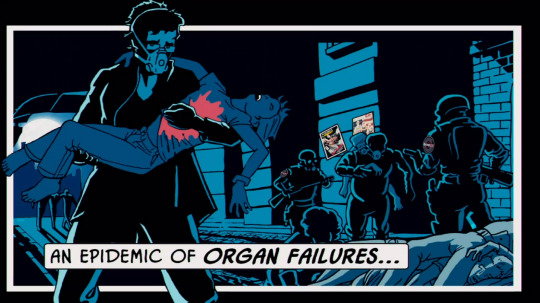
I never gave the premise much thought, at least not until recently. We aren't given much detail beyond the fact that entrepreneur Rottissimo "Rotti" Largo solved this crisis through his company GeneCo. GeneCo provides organ transplants that can be repaid through a payment plan. Witnessing the coronavirus unfold in real time and seeing its wrath, particularly on severe cases, honestly makes me wonder if the writers had some sort of "super plague" in mind when creating this universe. For the purpose of this analysis, I will assume that humanity suffered at least one infectious disease crisis. And just to reiterate covid-19 particularly, we really *don't* know what it's going to do to us long-term. Let the parallels begin.
The world in Repo! the Genetic Opera, operates as normally as the citizens possibly can, which appears to be quite limited. I have noted how dated some the technologies look.

For a world 30 years in the future, it lacks cell phones and easy access to internet. When we enter Shilo's world (aka her bedroom!) she watched Blind Mag sing on a busted up tiny ass TV and the program itself looks like an ad on Home Shopping Network.
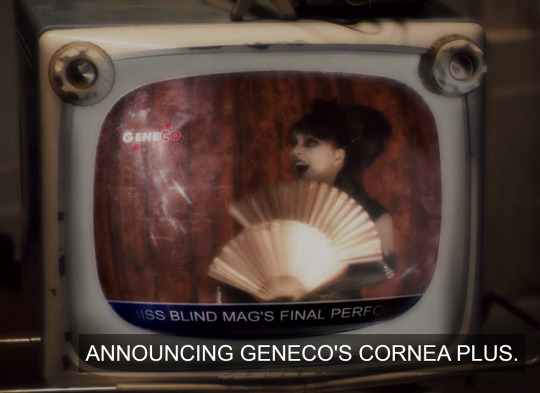
The Graverobber is shown reading headlines on a newspaper. The news reporters shown in the ribbon cutting ceremony during the 1st Italian Post-Plague Renaissance have old school cameras with flashbulbs.
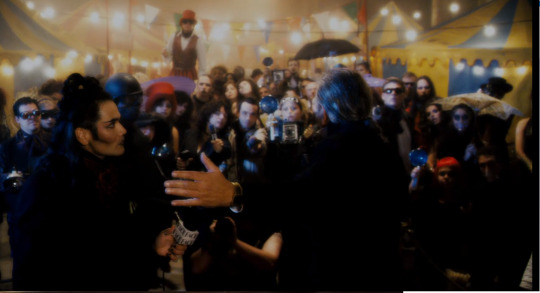
The most contemporary technology appears to be a Wish.com version of an Apple watch, and even that looks like a leftover prop from Spy Kids.
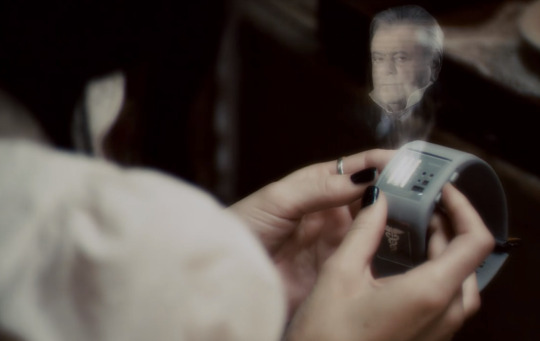
Obviously the people who made this movie intentionally inserted these anachronisms, but why? This is a science fiction movie after all. I speculate that they reverted back because the impact from humanity's crisis resulted in an overall professional "brain drain" from the sheer volume of professionals that dropped dead. In fact every scene depicting medical procedures looks dimly lit and lacking in sanitation. We will see this as we struggle to contain the coronavirus, at least in America. Healthcare workers have already died from this thing, and I am sure many prospective college students will have second thoughts about a career in healthcare.
I mean hell, look at no other than GeneCo itself. That company employs workers called "Genterns" who are most definitely not in full PPE. I don't doubt their medical expertise, but they appear to be disposable (please see: that time Luigi killed one for NO REASON in "Mark it Up").
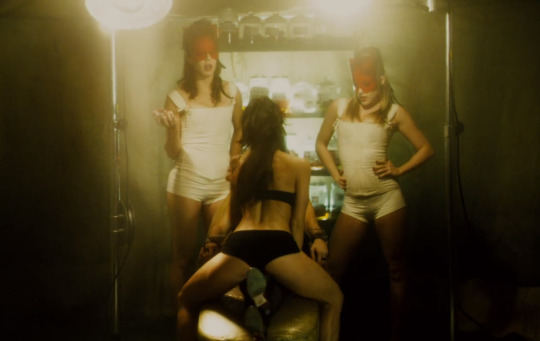
On that note, it really was quite incredible how China built the pop-up hospital in Wuhan in under 4 days, but it was also not the most safe or structurally sound building by far (it collapsed, people were hurt!). Maybe at this point, the people in Repo! don't have much of a choice. I am sure there were likely legit hospitals, but the fact that the Renaissance had gross surgery tents is a bit unsettling.
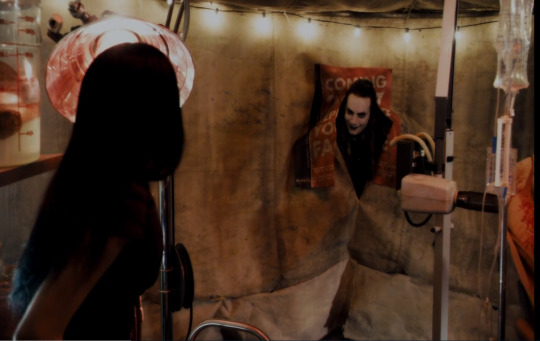
This is a world that is completely built upon the social more of valuing your health above all else. There had to be a turning point in the GeneCo business model where they really played on up-selling organs for the benefit of "genetic perfection".
"I needed a kidney transplant desperately. GeneCo showed this single mom sympathy. This makeover came for a small added fee. Now I look smashing on live TV!"
Imagine signing the documents for your power of attorney while actively going into renal failure, when your doctor chimes in with an up-sell for breast implants. When all is said an done, your body is now not only functioning again, but you're hot! Even in a post-plague dystopia we are still holding value to having a nice rack. What's not to love about GeneCo?
Obviously we know right away that GeneCo has a dirty side. Rotti Largo personally lobbied to make organ repossessions legal, and he does not hesitate to recollect his property.
The concept itself is, of course, wild. In America, our healthcare system is incredibly broken and expensive. You would wonder how it could get worse without us backpedaling many steps on the industrialization timeline. And in a lot of ways, I could see a company like GeneCo thrive here. We already hate the poor, and we have political think tanks that salivate over the idea of cutting social programs that keep people alive. Our president has wanted to repeal the Affordable Care Act while many people are unemployed during a pandemic.
In Repo! we hear about those who don't pay, but obviously there are plenty of people who do. Those who can will happily pay, either for vanity reasons or to stay alive.

And while society cites Rotti as being a "hero" for humanity, we see more and more evidence that the crisis is both not under control and life is cheap.
His son murders multiple people, in front of others, with seemingly no repercussions. In the scene where Shilo meets the Graverobber for the first time, adjacent to the graveyard and tombs owned by wealthy families who could afford grave markers, lies a poorly constructed wall hiding thousands of corpses piled on top of one another. We even get a glimpse of a truckload pouring more onto the pile. I would not be surprised if there is a disinformation campaign there keeping the public in the dark (although you'd think the smell would be unbearable at this point).

There are multiple indications that propaganda works in society (still), and no one is getting the full picture of how much of a raw deal the people in Repo! have. We see poster after poster about GeneCo, in the literal absence of other corporations.

And a lot of them bear resemblance to 20th century Russian propaganda. It would be a real shame if the goals outlined The Foundations of Geopolitics: The Geopolitical Future of Russia were actually realized. Imagine going to visit your mother's grave and hearing commercials for hardcore analgesics play through the cemetery. Also, there's a police presence too. Apparently the police are called Genecops and have authority to execute any assumed graverobbers on site.
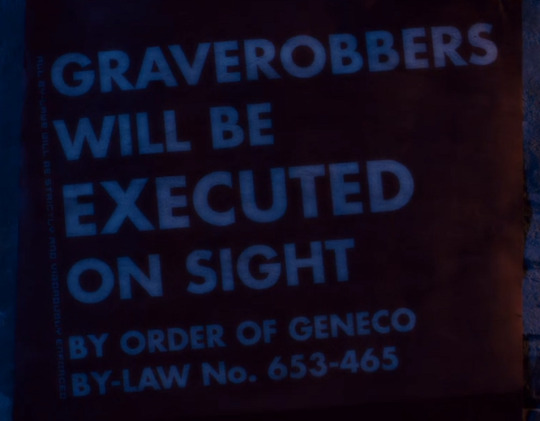
Imagine the hellscape it would be to live in a world where your loved ones may have died from a terrible pandemic, and you face a non-zero chance of an over zealous cop murdering you thereafter, and because their qualified immunity bypasses the judicial system entirely...oh wait.
Anyways let's circle back to the Graverobber character.
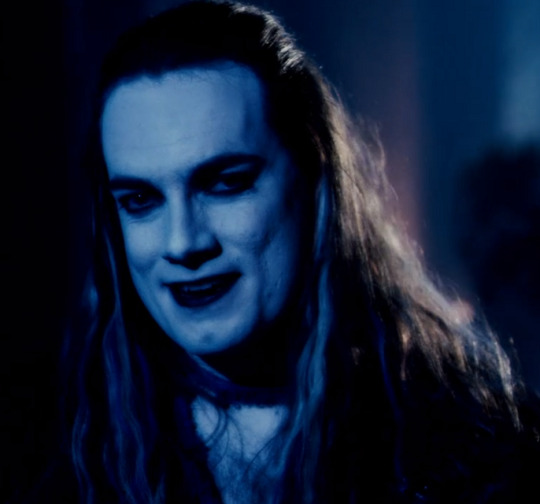
Graverobber's role in Repo! appears to be minor on the surface. Rotti's daughter, Amber Sweet, appears to almost despise her relationship with him. And that relationship involves him supplying Amber with what he describes as the "21st Century cure". This cure you ask? A super effective painkiller with the clinical use to accompany GeneCo surgeries. This drug is called Zydrate, and it has a street version that he acquires and sells, with clients including Amber Sweet.
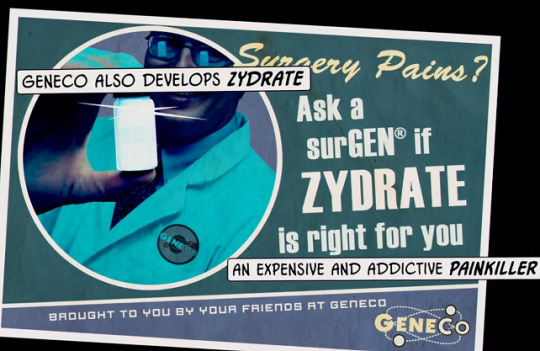
Graverobber makes his living sucking the glowy blue brain corpse goo and injecting them into people on the streets. Yum!
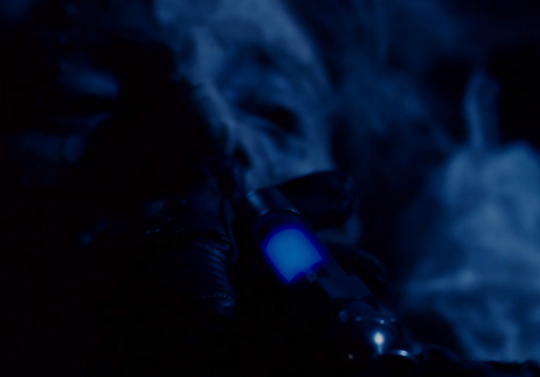
Not everyone who needs an organ transplant can pay for it all upfront. Luckily for them, GeneCo provides payment plan options! The caveat to this is if you fail to make those payments, legally GeneCo can come and repossess your newly acquired organs. If you find yourself past due, you will soon see the last face before your doom, the Repo Man. He will harvest GeneCo's property, and it won't matter where you are or what you are doing. There is no anesthetic, and you will likely die! This was all made legal through Rotti's lobbying efforts.

Society, as it's set up today, allows for property repossessions. This can be as straightforward as a repossession of your vehicle to as heartbreaking as a foreclosure on your home. At the end of the day, the impacts of that are difficult and life changing. Currently millions of people in America are out of work, and the threat of losing everything is at stake for many. We could lose our homes, our vehicles, and our sense of purpose. And while many government bodies have created temporary moratoriums, they have not provided any substantial financial relief to keep the proverbial repo man at bay. What went wrong in this dystopia to normalize the concept of death due to nonpayment?
Fascism! Ah yes, the dreaded f-word. In my next essay, I will outline the 14 characteristics of fascism and how it relates to the universe in Repo! After I will relate that to our modern world so that we can try and stop this from becoming our reality.
#repo! the genetic opera#repo#coronavirus#covid-19#dystopia#sci-fi#fascism#trump#zydrate#horror#musical#opera#sarah brightman#alexa vega#paris hilton#anthony head#gothic#death#plague#plagueposting#pandemic#genterns#luigi#pavi#rock opera
50 notes
·
View notes
Note
Nickelodeon gives you the task of writing a series based on Korra's earthbending successor with no limits on what you can do. How would you write his story?
Interesting that you say “his.” There’s no rule that the Avatars have to alternate gender, but at this point the fandom assumes it so much that I’d just go with it to avoid controversy.
Anyway, I’d probably turn Nickelodeon down if they wanted me to write Korra’s successor. I have no interest in the future that seems to be getting established in LoK. I want the franchise to stay in the past forever; there’s more than enough room, and I’d even be open to throwing away the concept of “canon” to tell stories that might merely be in-universe legends.
But, I’m going to try to answer the question in good faith. If I was a professional television writer/producer, and my career depended on saying yes to this and trying to do a good job, here’s what I’d do:
Working Title: The Last Avatar
Our star is a poor Earthlands boy. The Earth Kingdom collapsed years ago, Balkanizing into a bunching of struggling nations divided up haphazardly among various tribes, local cultures, and convenient geographical groupings. Our Boy is an Earthbender, but he hasn’t pursued any official training because it’s largely a waste of time and money. Instead, he’s been working his way through an education, learning about robotics and spirit-energy, because demand is high for that knowledge. He repairs old robots for spare money, and even has his own glitchy assistant -- who can transform into a van -- who he likes to trash-talk to show his love. He’s a huge nerd.
Actually, the only reason he can defend himself with Earthbending at all is because of a classmate and friend who’s passed on her own lessons. This girl is one of seventeen young adults who currently use the Beifong name. She’s a Metalbender using her ability to innovate with circuitry, very interested in technology and business, but she also values some of the old ways and thinks Bending is an important part of Earth culture that should not be ignored.
Our Boy knows he’s not the Avatar because the Avatar is a super-famous influencer, activist, pop-singer, and advertising icon. She lives in the Fire Nation and has green hair. You should picture Hatsune Miku for her. There are bigger celebrities, and none of her movies have been huge hits, but the Avatar still has enough culture significance that she was born famous and has managed to stay in the news.
By the way, Fire Nation culture is dominant. All the best stuff comes from the Fire Nation. Their movies, television, music, and video games are popular all over the world. Their technology is better. Their quality is life is better. They have the best doctors, the fastest internet, bigger apartments, the most prestigious schools, and the best jobs. Immigration is limited by law, in order to maintain their high quality of life.
The United Republic and the Water Tribes have seized some former Earth Kingdom territory, so their influence has expanded. The United Republic invested heavily in technology, and they’re now a dystopian cyberpunk nightmare with a government that just does whatever its corporations say. The president of the United Republic is a position that rich men use to become richer. The Water Tribes are a lot better, having managed to transition to a constitutional monarchy and maintain something like a balance between life and technology.
Note that I didn’t say “spirituality and technology,” because the two are one. All technology is spirit-powered. Spirits can meld with the internet. Spirits can inhabit robot bodies. Spirits and humans meet in abstract Virtual Realities where the difference between the two disappears.
And all of this orderly chaos is set to collapse when Our Boy accidentally Firebends during a dangerous action moment. He and Beifong Girl realize he might be the Avatar. But Hatsune Miku has demonstrated command of all four elements. On separate occasions she’s been seen and filmed Earthbending, Firebending, Waterbending, and Airbending, sometimes two at once. So how can Our Boy also do that?
Beifong Girl urges him to contact the Air Nation and the descendants of Avatar Aang to find out. Except, when he does with her family’s help, Dual-Benders -- warriors using two different elements -- try to kill him. He’s been betrayed by the Air Nation- and possibly the Beifong clan. His friend helps him get away, but she isn’t sure she can trust her family. They both go on the run, not sure what to do.
The mystery of what’s going on will drive the whole series. Here’s our cast:
Our Boy: The true Earthbending Avatar, completely untrained. He’s a poor nerd thrown into the deep end of a global conspiracy, but fortunately he has a robot who transforms into a van, so at least he has transporation.
Beifong Friend: Our Boy’s best friend. Not a love interest. She’s the youngest Beifong cousin, an Earthlands patriot who wants to raise the former Earth Kingdom out of its divided state using technology. She’s also far too gentle for her family of power-hungry vipers, but she’s still a great Earthbender and will become a Metalbender warrior before the end.
Fake Avatar Hatsune Miku: An artificial biological/spiritual construct of the Red Lotus, able to Bend two elements at any one time by swapping out a set of four spirits (all of whom are intelligent, devoted solely to her, and have different personalities), and the center of a conspiracy that she’s the Avatar. The Red Lotus built her and are using her to advance their plans. She joins the hunt for Our Boy, officially decrying him as a Disciple of a Vaatu cult trying to destroy humanity. However, she eventually begins to have thoughts of her own and resent how she’s used and abused as a tool rather than a person. She becomes our Deuteragonist, going rogue and having her own journey and arcs that intersect with Our Boy. Depending on fandom reaction, she might becomes Our Boy’s love interest, but might also become just another friend. She eventually frees her spirit friends, giving up all Bending powers.
Water Sage-Candidate: A young man who is training to be a Water Sage/Shaman. He’s a new-age hippie type who distrusts technology but likes people and spirits, wanting everyone to be nicer and more supportive to each other. He’s suspicious of what’s going on with this supposed Vatuu cult, despite his master (a Red Lotus infiltrator) telling him to trust in the true Avatar. When Our Boy and his friends come to Water Tribe territory, he joins up with them to help expose the truth.
Air Detective: An Airbender, a master detective and manhunter, who has been tasked with helping to track down Our Boy. It turns out she’s honest and completely ignorant of what’s really going on, so as she hunts Our Boy, she realizes the greater conspiracy at work- one that seems to have set its sights on the Air Nation back during the height of Avatar Korra’s influence. She’s older than the main cast and largely separate from them, but she does spend a lot of time with Fake Avatar Hatsune Miku and becomes something of a mentor to her. She struggles balancing Airbender ideals and her own cynicism about humanity, and is probably the best fighter in the story.
The Red Lotus: Our villains. They have infiltrated every level of every government in the world, and have figured how to replicate what Raava did with Wan- use a melding between spirits and humans to swap out Bending powers. They have managed to get up to a human/spirit combo being able to actively use two at a time, but they’re hot on replicating the full Avatar experience. The idea is that they eventually want to give everyone full Avatar powers, ruining the office of the Avatar and empowering everyone with the strength to topple governments and businesses. Any single person can knock over a building and kill thousands. And for those who are incompatible with the melding process and explode- well, those are necessary losses. Red Lotus foot soldiers will often have, as one of their two elements, Firebending.
Red Lotus Traitor: A NonBender history nerd from a Red Lotus family. The more he sees as he’s initiated into the family business, the more horrified he becomes, but he successfully manages to hide it- which is good, because recruits who balk tend to wind up dead in ‘accidents.’ When Our Boy comes to the Fire Nation, he and his friends encounter the Traitor, which brings them to the Red Lotus’s attention, but the Traitor finally breaks free and gets the group out, joining them.
Boss Red Lotus: The leader of the Red Lotus. A NonBender. She and her family -- siblings, a father or mother we can maybe tie to a character in LoK, and maybe a kid or spouse -- are running the whole show and have inherited the plan that the Red Lotus are executing. What separates Boss Red Lotus is her personal investment in Fake Avatar Hasune Miku. She thinks of herself as Miku’s mother, and has become more interested in creating a higher form of life than merely giving humanity Avatar powers. She grows more obsessed when Miku goes rogue and commissions a more advanced clone.
Fake Love Interest: A love interest for Our Boy who is a little bit weird and a little bit cool, very pretty in a vaguely gothy way, and fond of bugs. This is actually Koh in disguise as a human, and the romance doesn’t work out. It will be awesome, trust me.
The bulk of the series is Our Boy and his growing group of friends tooling around the world in their robot-van, chased by Fake Avatar Hatsune Miku and the Airbender Detective, slowly uncovering the Red Lotus conspiracy and eventually rising up to save the world with the help of everyone who isn’t evil. The setting is dark and inspired by science-fiction, and there’s a theme of rediscovering the past, but the past doesn’t always hold the solution. Sometimes, the past merely contains the mistakes that led to today’s problems. The redemption of the world usually comes from getting in touch with the culture of the past, and mixing that with the wondrous new technology available today.
The ending I’m envisioning is a kind of embracing of the Red Lotus’s plan, but a non-destructive form. Everyone gets all four elements, but no one is killed by it, and the power level is completely normal. The Avatar, though, is the sole person to be able to Energybend, and it’s this role -- being able to explore the limitless potential of humanity -- that makes the Avatar important going forward. The significant Red Lotus are all sucked into hell or the Fog of Lost Souls or something, except for those who die outright, with the rest being rehabilitated.
Romance will be downplayed, aside from the fakeout with Koh, but if any of the recurring characters show some chemistry, there’s room to develop it. The Fake Avatar Hatsune Miku should be designed to be the audience’s tortured, angsty, badass waifu.
The next level of development for these ideas should come from the Concept Artist team, especially focusing on the weapons used in this setting. This will be followed by a more detailed revision by me with major plot points, and then going to the writers’ room for development of the first season. Entire characters or concepts may disappear or be added during that time.
Merchandising should emphasize the Tron Lines on everyone’s clothing that glow when Bending. Also, the Robot Van can be expanded to a whole line of transforming robots toys, although the word “transform” should not appear in any official material. We see video games as a major licensing opportunity, with a possibility for “canon” stories set in the same time period, intersecting with the cartoon’s main plot. To this end, final character designs should perhaps be modeled on voice actors, so that face scans or motion capture can be employed for AAA video game appearances.
And that’s my pitch.
12 notes
·
View notes
Text
Magic in the Air: Chapter 5
Description: Patton offers to help. That’s all he’s really ever wanted to do. Help his friends. But will that eventually lead to a mess that he wasn’t prepared for?
Pairings: roceit, analogical, intruality, platonic DRLAMP
Warnings: food mention, blood mention, slightly gorey image mention (please let me know if I missed anything or if you want something tagged)
Word Count: 1,746
Chapter 1, Chapter 2, Chapter 3, Chapter 4, Chapter 6, Chapter 7, Chapter 8, Chapter 9
“Watch out!”
The yell came from the living room and at the sound, Patton instinctively ducked (quack), biting his lip as a book slammed into the kitchen wall behind him. He had been doing a lot of that recently…ducking that is. With Roman, Virgil, and Dee all working on their magic over the past few weeks, the household had become a bit of a chaotic mess.
“Sorry, Padre.” Roman apologized coming into the kitchen to grab the book. “You ok?”
“Perfectly dandy, Ro.” Patton grinned, standing up and patting Roman on the back. Roman returned the smile and hurried back to the living room when Logan called his name.
“Hello, Patton.” A smooth voice greeted from the front doorway. Dee made his way into the kitchen to stand next to Patton and sighed gazing int the living room. “How is our favorite prince doing today?”
After Roman had gained a little more confidence, he had started having his lessons separate from Dee once again in order to make the best of all of their schedules. Needless to say, their schedules had become a bit hectic ever since everybody started gaining magic all of a sudden. Even Remus and Patton were swamped with trying to help Logan in his experiments, keep up with their own class schedules and being there for the three struggling with controlling their magic.
“I think he’s doing great. Only one book flew in here today, so that’s a bonus!” Patton cheered, smiling at Dee.
“Oh?” Dee purred letting a soft grin inch its way onto his face. “How marvelous.” Patton nodded in agreement, looking toward the living room where Roman had six things hovering in the air.
“That’s the most he’s gotten to, right?” Patton asked as Roman started moving the things in a circle in the air. It looked like he was juggling without actually touching anything. He’d been working really hard to get that part right. Since he had had his magic a bit longer than the others and now knew a bit more about his limits thanks to…what had happened, he had really mastered just floating the objects and had moved on to rotating them, moving them, and adding more objects. It was amazing to see him improving rather fast, even if he sometimes still lost control of an object or two. After he had set the objects down, he glanced into the kitchen and spotted Dee. With a quick word to Logan, he ran over and jumped at his boyfriend. Dee let out a little oomph as he caught Roman and supported his weight while the actor wrapped his legs around Dee’s waist.
“Did you see, Dee?” He gasped, like an excited child. “I got six objects up this time.”
“I saw, my prince. You did amazing!” Dee encouraged, pecking Roman on the nose.
“I’d say you’re actually improving quite quickly Roman.” Logan chimed in from where he’d come to stand at the doorway of the kitchen. Roman smiled gratefully at him as he finally released Dee.
“Thanks, Lo.”
“I’m only speaking the truth.” Logan replied, smirking softly as Roman blushed at the compliment. As Logan opened his mouth to continue, a heavy thumping on the staircase drew all of their attention.
“Logan, we’re gonna be late for class! You said you’d come get me ten minutes before we had to leave.” Virgil panicked as he rushed suddenly downstairs and headed toward the door. Surprised, Logan checked his watch and cursed under his breath.
“Great job today Roman. Don’t forget that you and Dee have tomorrow off because I have to help Virgil make one of the backgrounds for the play.” Logan reminded as he grabbed his bag and quickly followed Virgil to the door. Patton smiled after them, giggling at how obvious it was that they were dating. They hadn’t outright said it yet, but it wasn’t hard to tell. He knew that Dee knew as well from the knowing looks he kept giving the two. It was great that they got to work in at least one of the same classes together. With Logan being in Theater Design and Technology and Virgil being in Stagecraft, they often worked together on projects for the school’s major productions too. In fact, all of the others were also pursuing careers in theatre: Dee in costume designing, Remus in stage makeup, and Roman in acting. However, Patton himself was majoring in Dance. Sometimes he was a bit sad that he was the only one that never got to help in the production of the plays, but he at least got to help Roman when he was auditioning for a musical and needed help with the dances. Plus, Remus often helped him practice his partnered dances since he had always been interested in the subject. Speaking of Remus…
“Has anyone seen Remus? I have something he needs for his makeup class.” Patton remembered.
“I think he was in his room last I saw him.” Roman answered as he began to get the ingredients to make himself a sandwich.
“Would you like a sandwich Pat?” he offered, looking up.
“Aw, thanks kiddo! That’d be great! Could you make one for Remus too? I don’t think he’s come out of his room all day, so he probably hasn’t eaten.”
“Sure, but I am not adding sardines to his ham sandwich this time. He wants those he can get them himself.”
Patton giggled softly before heading upstairs to get the makeup brushes he had for Remus. He had borrowed them to do his makeup for a costumed dance routine he had to do for class last week and kept forgetting to give them back, but Remus could only last so long making up excuses for why he didn’t have his makeup brushes in a makeup class. He was getting ready to knock on Remus’s door when he heard angry muttering from the other side. Slightly worried, he hesitantly knocked on the door anyway.
“Remus? Kiddo? Roman made some sandwiches for lunch if you want to come and eat” he called. The muttering fell silent but there was no answer.
“Um, Are you ok?” Patton asked hesitantly.
“’M fine.” Remus responded, sounding unconvincing. His answer was much quieter than usual and there was a slight waver to his voice.
“I’m coming in, ok?”
When there was no answer, Patton took that as an ok and cautiously opened the door.
Remus was slumped over at his desk, his head resting on a piece of artwork of a girl with half of her face completely covered in tiny cracks that branched out and bled into the rest of her face and down into her neck…like a china doll that had been dropped and shattered, just on the verge of breaking completely. It was haunting but still beautiful, and though it wasn’t Patton’s type of art, he could still admire the talent and work that went into it.
“That’s beautiful, Remus.” He complimented, still gazing at how intricate the cracks were drawn. Remus snapped his head up and stared at Patton then looked back to his drawing.
“You think?” he asked, chewing his lip as he studied the picture.
“Yeah, of course! The cracks in the face are so intricate and you did her hair so nicely and the way the fractures kinda start to bleed into the rest of her face but fade off. It’s really great. You did amazing.”
“It was gonna be my project for my makeup class. I was gonna add some blood seeping from the cracks and not paint her face so it’d look like an actual fractured human face instead of just a cracked doll and everything! I mean, a cracked china doll is so overdone, right? This way, it’ll look much cooler and probably be a lot creepier. And a bit more gory, with the blood and flesh and stuff.” Remus ranted, smiling at the thought. Patton tried not to grimace at the concept. It really was very cool…just not his type of thing.
“What changed? Did you find a better project to do?” Patton asked noticing that Remus’s smile faded at the question.
“My professor said that it wasn’t possible for someone with my skillset to get it perfected in time and recommended I pick an easier design.”
“What? But that doesn’t make any sense. You’re not going to learn new skills if you don’t challenge yourself. I mean you are in the class to improve your skillset.”
Remus was silent for a minute before speaking again.
“So…you don’t think I have the skillset either?” he asked quietly.
“Wh—No, Remus. That’s not what I meant. Not at all. I actually think this is right up your alley. I’m sure you’d do amazing. I’m just saying even if that’s what he believes, he should still let you do the project. So what if its challenging? You’re there to learn aren’t you? And if you want to push yourself so you can grow, I think he should encourage that not turn you away from it.” Patton pointed out. Remus smiled, but it still seemed too sad for Patton’s taste.
“What if you did it anyway?” he suggested. Remus’s grin suddenly turned mischievous as he raised an eyebrow.
“Patton are you suggesting that I disobey authority? I never thought I’d see the day.” He gasped dramatically. Patton flushed bright red as he slapped Remus’s shoulder playfully.
“I-I just think that if you do it and perfect it anyway, then you can prove it to him that he was wrong.” Patton defended “But this isn’t worth a lot of your grade or anything right? Because it might be best if you don’t test your professor when you can fail the whole class because of it.”
“No, of course not. It’s just a little project.” Remus replied, waving it off and looking away. Patton raised an eyebrow at his suspicious reaction but shrugged it off as Remus continued.
“I need a subject to practice it on though. None of my classmates like to be my subject anymore.” He pouted.
“Well, I could be your subject if you like.” Patton offered.
“You—You will? But this—I mean, this isn’t usually your thing.”
“It’s not but it still looks really cool, and you always help me with my dance routines. It’s the least I could do.”
“Ok, then. Thanks Patty Cakes!” Remus grinned. Patton nodded, hiding a blush.
“Anytime. Now let’s go get those sandwiches.”
Taglist: @catolicabuena @look-ma-im-on-tv @its-always-the-witching-hour @sure-i-exist @wellhellothere09 @star-crossed-shipper @cemmy
#food mention#blood mention#gorey image#roceit#analogical#intruality#platonic drlamp#ts patton#ts roman#ts logan#ts remus#ts virgil#ts deceit#sanders sides#sanders sides fics#my fics#cait writes#ts magic au#ts human au
33 notes
·
View notes
Photo
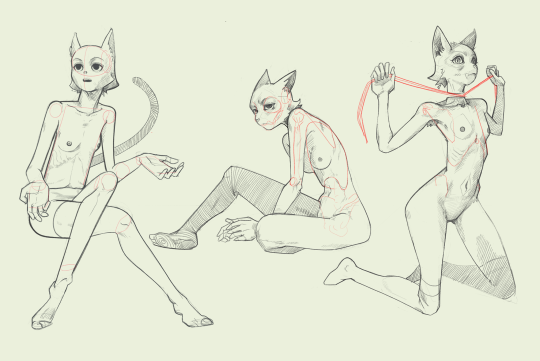
One of the many sketches I’ve done this summer, trying to figure out how to teach the figure drawing/character design class online. Of course, these indulgent drawings are just for me, but they help me think about the biopolitics of figure drawing in the current moment (of pandemic, of political unrest, of collective trauma)
First some background: From late modernism onwards, the whole enterprise of academic figure drawing becomes highly suspect. As I understand it, the french academic tradition (that spread through Europe and into the US) established the educational standards of anatomy and naturalistic rendering, with the aim of training artists in the creation of highly emotional images. These images would be used by the state to form cohesive and durable nationalist identities: cheesy neoclassical paintings that drew a connection between France’s III republic to ancient Greece and its idealized concept of democracy. Like Uncle Sam in America’s WWI, these neoclassical mascots have one purpose above all: to rouse the spirit in service of the sovereign (emperor, corporation) for easy manipulation. Now, dear person reading this, you may agree with the project of building a national imagery regardless of how “ahistorical” these pictures may be. But you have give modernist their due: the worst excesses of these canons were embarrassingly in evidence during the Third Reich, with its obsession over "perfect” bodies for a “perfect” race.
So drawing state-sanctioned “perfect” bodies is out of the question, but modernist didn’t really delivered us from sin either. There are just too many examples of asshole “genius” artists who thrived on a predatory relationship to their subjects (Gaugin and Picasso, anyone?) It seems that the emancipatory gesture against the naive bourgeoise taste could not extend to the issues of gender and race inequalities. Postmodern artists, aligned to feminist, queer and anti-colonial projects, thrived on these active biopolitics, engaging them to draw attention to injustice, to deal with false consciousness and internalized opression, and to express long-repressed lust. The question become not whether we should do figure drawing, but who and why should do it. I find the question to be eminently just and interesting, but just as often, paralyzing.
In this context, a class “Figure Drawing/Character Design” may look, from the outside like a puzzling idea. It is like a bad recipe that mixes modernis-postmodernist unresolved issues with total capitulation to market forces. Anime? Cartoons? Caricatures? Stories? And all of it mixed with figure drawing? How can this be insightful?
Figuring the potential for insight in this class, given this context I sketch here, has been my challenge for the last five years. I could simply say that there is a market for it, that students/audiences like it, that gaining skills is pragmatic, that people have been drawing “characters” from prehistory... and just move on feeling justified. But that wont do.
One day I will write something scholarly about this, but here is a sketch of why I think this class has the potential for insight: Character design and figure drawing exist in the context of a complete immersion in capitalist communication technologies. After giving ourselves a moment to mourn the fall fo the Berlin Wall (if that’s your jam,) we must understand that our existence in this soup of capitalist communication technologies has the effect of diluting the membrane that trap us in our bodies. The concept of “Character Design” as something that can be learned and practiced by anyone (the putative project of art education) means that we all have the right toy around with the body. Paradoxically, the fact that we all are here shouting in social media, telling our stories and drawing our traumas, attenuates some of the inequalities that made modernist and postmodernist so anxious. Character Design is a conversational tool, a shared language that a huge mass of “content creators” use to talk about The Other, and by extension, The Self.
To put it clearly, drawing characters reveals a deep longing for The Other - an enormously human need for proximity and validation (just ask Henry Darger). But because, in the “old, real world” The Other is prickly and hurts (and we hurt them), we must negotiate. Like transitional objects, these characters facilitate the exploration of new shared realities, new embodiments.
Here is the secret you should know: every character I draw is me. Is not a portrait of me, is not a realistic or idealized version of me. It is me extending my being into matter, exploring other bodies, and making those explorations have real stakes thanks to erotic, violent or tender psychodynamics. In every choice I make about the design of my characters I detect, after the fact, the longings, traumas and hopes to form my personality. For example: all this skinny catgirls I’ve been drawing since Im 12 (way before I knew what the internet and furry or anime was) are intimatel related to life-long struggle with body dysmorphia. As I draw a crispy ribcage, I can feel the sharp angles as if they were mine, to mention one example.
The figure component of the class comes into play in a very specific way: the ritual of drawing a nude model in person is a perfect illustration of the shared responsibility for reality formation among people. Nude models, who must stay still and never turn their heads around to scan the room, depend on all artists in attendance to hold the world together, to perceive and refigure what the model can’t see. It is a powerfully intimate dynamic in which the model imposes a moral contract. The model says “ you see me naked and I hold you responsible for my well being, as I remain in this vulnerable position, all in service of this ritual that transcends us both.” To bring storytelling and character design into the mix (that is, to bring the vulnerability revealed by design choices, as in the case of my anorexic catgirls), is to up the ante. I’ve seen it in the room: both artist and model disrobe, the model by putting themslves, nude, in the hands of us artists in attendance. The artists by revealing their current negotiation with The Other through their characters.
And now I gotta teach this remotely. The model is not available, and so the stakes feel lower, less challenging. As I was drawing these characters using cheesy nude photos I found on some website, I realized that I missed the sacred contract, the confessional dimension of drawing like this in the figure drawing room. I guess I’m writing all of this precisely because I feel the need to confess.
13 notes
·
View notes
Text
How the Cyberpunk 2077 Soundtrack Found Its Dystopian Sound in a Soviet-Era Synthesizer
https://ift.tt/2Knk6oM
CD Projekt Red’s Cyberpunk 2077 is arguably the the biggest video game release of 2020, transporting players to a gritty sci-fi world full of bio-augmented criminals and lowlives. True to its name, the game explores some pretty deep concepts about cyberspace and what life might be like in a futuristic transhuman society where technological advancements have turned us less human and more machine. So it’s no surprise that the game’s score often sounds like something recovered from the year 2077 and brought back to our time. At its very best, the soundtrack elevates this grim dystopia.
In the wake of Cyberpunk 2077‘s massive launch, Den of Geek spoke with the trio of composers behind the game’s score: Marcin Przybylowicz (The Witcher 3: Wild Hunt), P.T. Adamczyk (Gwent: The Witcher Card Game), and Paul Leonard-Morgan (Dredd). The three composers discussed the soundtrack’s conception and revealed the unconventional methods they used to create the score’s unique, ominous sound.
The Cyberpunk 2077 Original Score, which contains two discs-worth of the game’s enormous pool of music, is available now to buy and stream. As players have discovered in the week since the game’s launch, the score isn’t exactly the pulsating, adrenaline-fueled synth barrage some might be expecting from a cyberpunk title. It’s largely ambient, with ominous layers of otherworldly bass bellows, tribal beats that sound both futuristic and primal, and melancholic wades through placid synth soundscapes. There are definitely bangers on the tracklist, but what stands out is that many of the pieces almost feel introspective.
“You’re dealing with a complex story, and there’s [a vast] number of characters in Cyberpunk,” Adamczyk explains. “Finding a theme or an idea or a motif and being confident in it…that’s really difficult because there are so many different things happening in the story, and you could score it a thousand different ways. And they all would be good enough. But the question remains, ‘What is the essence?’”
Przybylowicz was the first of the three composers to start work on the score for Cyberpunk 2077 very early in the game’s production. In laying the foundations for what the game’s music would sound like (the elusive “essence” Adamczyk speaks of), he set out to create something unique, though he was also committed to honoring the source material that the game is steeped in.
“We were trying to find out how our take on Cyberpunk would differ from other bits of culture,” says Marcin of the initial creative process. “We must never forget that our game is not a game that is simply set in a yberpunk universe. Our game is Cyberpunk 2077, which means that it’s based on a very well described and very lore-heavy, already existing universe, Cyberpunk 2020 by Mike Pondsmith. So that means there is a ton of source material, tons of creative work that has already been done before. So we needed to reach out to these books and see if we could pinpoint anything that would remain useful for us after we move the events from 2020 to 2077. Then we started to formulate how that would translate to the game’s sonic palette.”
The original tabletop game paints a picture of an alternate future in which corruption reigns and oppressive megacorporations wage war on each other, as the denizens of gang-infested, urban sprawls like Night City struggle to survive on the streets. Humans and machines intertwine via cybernetic enhancements, and this unholy merging of flesh and technology is represented vividly in the game’s score, which often employs the use of synth that sounds both metallic and organic.
The majority of electronic music is created from a widely-available database of preset sounds built into a computer or synth. To create Cyberpunk 2077’s unique sonic identity, the composers eschewed convention and took a more experimental approach, using a slew of odd machines to create bespoke sounds that give the score its ethereal edge.
“What we’ve done is ridiculous,” Leonard-Morgan explains. “It hasn’t been done before. We’ve composed with virtually no software at all. It’s all external gear. So it’s all weird and wacky synthesizers, all weird modular synths, always stuff which you then had to record the audio and process that around. You can never recreate the sounds again.”
The trio used rare, long out-of-production machines, took their already unique built-in sounds, and manipulated them further to compose the game’s music. The result is a tapestry of interconnected compositions that have a dark, Frankenstein’s-monster bizarreness to them, and one of the most prominent and peculiar synths you’ll hear in the mix has a curious background of its own.
“P.T. and I own our own Soviet-made Polivokses. Mine’s from 1982,” Przybylowicz says. “My Polivoks still has a price tag: 800 Rubles, which is, I think by today’s standards, 10 bucks. It’s a duophonic synthesizer similar to the Moog Sub 37, which is a very famous duophonic unit. I heard a story that during the Cold War, blueprints [of the Moog Sub 37] were stolen by Soviet agents in order to obtain something that they could copy [to build their own synthesizer]. Supposedly they were trying to make an exact copy, but you know, something always goes wrong on the production lines–they ended up with a machine that is truly, remarkably ugly-sounding. Yet still sounds like nothing else.”
Read more
Games
Cyberpunk 2077: Every Ending Explained
By Matthew Byrd
Games
Best Cyberpunk 2077 Weapons and Where to Find Them
By Matthew Byrd
Another strange machine in the trio’s fleet of synths is the Folktek Mescaline, an infernal-looking mess of jet-black panels, spiraling bronze detailing, and a scattered arrangement of inputs, knobs, buttons, and switches. It looks so intimidating and unapproachable that it’s no wonder the trio harnessed its power in their compositions.
“All three of us own Folktek Mescalines,” Przybylowicz says. “It’s a small modular system that allows you to basically do anything. It doesn’t come with a very good manual. It doesn’t feature keyboards. It doesn’t feature any self-explanatory indications of what’s doing what. So it’s all based on experimentation.”
Adamczyk elaborates, “You can’t really decide, ‘I’m just going to play an A minor chord’ on a Mescaline. Getting an A minor chord is a real pain in the ass because you have to pretty much tune the machine to that specific chord. You have to try to find your way with these instruments and try to somehow find a musical way of using them. Half of the time, you have no idea what you’re doing.”
The game boasts around eight hours of music that, amazingly, is virtually all in the key of A minor to allow the different compositions to flow seamlessly in and out of each other as the player transitions between different encounters and scenarios.
“Games are like living organisms,” Przybylowicz explains. “It’s dependent on the player’s actions, even if we’re talking about the most linear scripted games. Ours obviously is nothing like that. It’s a full-fledged, open-world RPG with multiple branching lines in the narrative arc. So obviously it’s even more difficult [to compose for], but I think in a sense it’s almost liberating to work on a thing that changes so many times during even a single playthrough, you know?”
Cyberpunk 2077 had fans practically salivating in the days leading to its release date. It’s not only the next chapter of a long-beloved sci-fi franchise, but CD Projekt RED’s follow-up to the all-time classic The Witcher 3: Wild Hunt, which is, to put it mildly, a tough act to follow. The composers feel the magnitude of the moment, though they remain unshakable, confident in the work they’ve put forward.
“Working on a game of such a big scale, ambition and quality and fan base…I think it naturally adds to the pressure,” says Przybylowicz. “So the bigger the hype gets, the bigger the expectations are getting, and the bigger the pressure gets. I think it’s at least in some parts a natural process of this profession, when you get to work on a project of this reputation.”
cnx.cmd.push(function() { cnx({ playerId: "106e33c0-3911-473c-b599-b1426db57530", }).render("0270c398a82f44f49c23c16122516796"); });
“It doesn’t matter for me whether it’s a one million dollar film, a hundred million dollar film, a billion-dollar game, or whatever,” Leonard-Morgan adds. “The point is it’s all about the creative process. That’s the part that I really, really enjoy. And I think as soon as you start letting external forces come into your head, that’s where I start to kind of…Self-doubt is the wrong phrase. But you start second-guessing, and second guessing is just the worst thing you can do as a composer.”
You can listen to the score below:
Cyberpunk 2077 is out now on PlayStation 5, Xbox Series X, PC, PlayStation 4, Xbox One, and Google Stadia.
The post How the Cyberpunk 2077 Soundtrack Found Its Dystopian Sound in a Soviet-Era Synthesizer appeared first on Den of Geek.
from Den of Geek https://ift.tt/3an3h8A
3 notes
·
View notes
Link
Strategizing For A Living Revolution
By George Lakey
Otpur (“Resistance” in Serbian) began as hundreds, then thousands, then tens of thousands of young people took to the streets to rid their country of dictator Slobadan Milosevic. Impatient with the cautious ways of many of their pro-democracy elders, the youths organized in coffee bars and schools, posted graffiti almost everywhere, and used their street actions to embarass the regime.
Milosevic counter-attacked. His police routinely beat up the protesters, in the streets and more thoroughly in the police stations. His spies were everywhere. His monopoly of the mass media meant that the Otpur was described as hoodlums and terrorists.
In October 2000 Otpur won; joined by hundreds of thousands of workers and professionals, the young people threw Milosevic out. His party was in disarray, his police in confusion, his army was split.
From the moment Otpur began it had a strategy. The young people were immensely creative in their tactics and at the same time realized that no struggle is ever won simply by a series of actions. Otpur activists knew they could only succeed by creating a strategy that guided a largely decentralized network of groups.
Cynical outsiders were skeptical when Otpur activists claimed not to have a leader, when the young people said they were all leaders and shared responsibility for their actions and their common discipline. What the skeptics overlooked was the power of strategy as a unifying force, taking its place beside the rebel energy and the lessons of recent history that the young people shared. Otpur activists didn't need an underground commander giving them their marching orders because they shared a strategy they believed in; they were happy to improvise creatively within that strategic framework.
Bojan Zarkovic, one of the Otpur trainers, told an audience at the A-Space (anarchist coffee house) in Philadelphia about the boundless creativity of the young people. They would virtually fill a wall of newsprint with their tactical ideas, he said. Then they would choose, in light of their strategy and also their preference for humor and pranks. The result was that the media's painting of them as terrorists lost credibility. True, these young people wore black jeans, black leather jackets, and black T-shirts with a clenched fist silk-screened on the front, but their actions had humor andconnected with people. Passersby who saw them (and spread the word) debunked the media portrayal. “They're our kids having fun and, you know, they're right about Milosevic!” is what they said as they spread the word.
Late '90s Serbia was different in many ways from the situation facing activists in the U.S. or other countries. Even so, Otpur's experience can stimulate our thinking. Given how many activists are tired of an endless round of protests that don't seem to add up to anything, Otpur activists' biggest gift to us might be their choice to unite around a strategy, to get creative about tactics, and to let the strategy guide which tactics make sense and which don't.
Strategy = Power
The young people who started Otpur had a clear conception of how domination works. They saw their society as a pyramid, with Milosevic and his cronies at the top, in alliance with business owners, party leaders, and generals. The direction of power was typically top-down, and included both obvious repression (the army, police, secret police) and subtle repression like a monopoly of the media and school curricula. Here's where Otpur activists diverged from conventional wisdom about power. They noticed that each layer of domination was in fact supported by the layer below; that the orders that were given were only carried out because those below were willing to carry them out.
Rather than buy into the top-down version of power that Milosevic wanted them to believe, they decided instead to picture Serbian society as organized into pillars of support holding up the dictator. If the pillars gave way, Otpur believed that Milosevic would fall.
This alternative view of power became so central to Otpur that it was taught in all the trainings of new Otpur members. (All new Otpur members were expected to go through the training so they could understand the winning strategy.)
Since the top power-holders depend on the compliance of those beneath them to stay on top, Otpur's strategy was to weaken the compliance and finally to break it. First, Otpur needed to ask: which are the pillars of support needed by the dictatorship? Then: what are the tactics that will weaken those pillars?
Activists in other countries can follow this methodology to begin to create their strategy.
Here's just one example of how it worked in Serbia. One pillar of support for Milosevic was his police. Otpur systematically undermined that pillar. The young activists knew that fighting the police would strengthen police loyalty to Milosevic (and also support the mass media claim that the young people were hoodlums and terrorists). So they trained themselves to make nonviolent responses to police violence during protests. One of the slogans they learned during their trainings was: “It only hurts if you're scared.” They took photos of their wounded. They enlarged the photos, put them on signs, and carried the signs in front of the houses of the police who hurt them. They talked to the cop's neighbors about it, took the signs to the schools of the police officers' children and talked with the children about it. After a year of this, police were plainly reluctant to beat Otpur activists even when ordered to do so, because they didn't want the negative reactions of their family, friends, neighbors.
The young people joked with the plainclothes police assigned to infiltrate them and reminded the cops that everyone would get their chance to act for democracy. Through the assertive outreach of the activists, relationships were built with the police, even into the higher ranks. When the movement ripened into a full-fledged insurgency in Belgrade, many police were sent out of the city by their commanders while other police simply watched the crowds take over the Parliament building.
It wasn't easy, as one of my Otpur friends who had been beaten repeatedly told me. It was, however, simple; the strategy guided the young activists to develop creative tactics that took away one of the key pillars of the dictator's support.
Can this alternative view of power work other places?
One reason why the Otpur activists worked so efficiently at undermining the various pillars of Milosevic' support was because many knew their view of power had already worked in other places. Consider what had happened within the lifetime of Otpur teenagers: the Philippine dictator Marcos had been overthrown by what was called “people power” in 1986; Communist dictatorships had been overthrown by people power in East Germany, Czechoslovakia, Hungary, and Poland in 1989; commanders in the KGB, army, and Communist Party were prevented by people power from establishing a coup in Russia in 1991; a mass nonviolent uprising in Thailand prevented a top military general from consolidating his power in 1993; the South African whites' monopoly political rule was broken in 1994 after a decade of largely nonviolent struggle. In all these places the power-holders found their power slipping away because those they depended on refused any longer to follow the script.
When I was trying as a young man to puzzle out this alternative view of power, so different from what is usually taught in school, I encountered Bernard Lafayette, who was then a Student Nonviolent Coordinating Committee (SNCC) staffer from the deep South. He explained it to me with a metaphor. Bernard said that a society is like a house. The foundation is the cooperation or compliance of the people. The roof is the state and its repressive apparatus. He asked me what happens to the house if the foundation gives way. He went on to ask: “How will it change what happens if more weapons are put on the roof, bigger tanks, more fancy technology? What will happen to the house then, if the foundation gives way?”
I then realized why this alternative view isn't promoted in school. What power holders would want us to know that the power is in fact in our hands? That instead of being intimidated by police, military, corporate leaders, media tycoons, and politicians, the people were to find out that we give away our power through compliance, and we can take it back again through noncooperation?
Of course the power holders want us to believe that power is top-down, that we must be passive, that violence is the most powerful force. Don't look for them to declare a national holiday dedicated to People Power!
And they don't need to. The use of nonviolent tactics to force change has a deep track record which is reaching critical mass. For example, hundreds of thousands of people of color have used nonviolent direct action in campaigns for over a century in the U.S. alone. (In 1876 in St. Louis African Americans were doing freedom rides against discrimination on trolley cars, to take one of thousands of examples.) In any given week there are community-based organizations of people of color, all across the U.S., who are engaged in nonviolent action: marches, sit-ins, street blockades, boycotts, civil disobedience, and the like. Books could be written just about the unions of people of color, like the hospital workers, hotel workers, and janitors, who go out on strike as well as use other tactics. While names of people of color most easily leap to mind when we think of nonviolent action, like Martin Luther King and Cesar Chavez, and a higher proportion of blacks than whites participate in nonviolent struggles, it's still not just “a black thing.” Whites in the U.S., especially working class whites, also have a long track record of using nonviolent tactics to struggle for their goals. The challenge is not so much encouraging diverse peoples to engage in nonviolent struggle when they are up against it; the challenge is to link short-run struggles to more far-ranging goals4.
Noncooperation is not enough My friends in Otpur would be the first to admit that a mass insurgency that brings down a dictator is not enough—not enough to establish full democracy, respect for diversity, economic institutions in harmony with the earth, or other parts of their vision. It's one thing to open up a power vacuum through noncooperation (and that is a great and honorable achievement). It's another thing firmly to establish the democratic community we deserve.
For that, the strategy must go deeper. We need to go beyond what has been done plenty of times in history—to overthrow unjust governments through nonviolent struggle—and create a strategy that builds at the same time as it destroys. We need a strategy that validates alternatives, supports the experience of freedom, and expands the skills of cooperation. We need a political strategy that is at the same time a community strategy, one that says “yes” to creative innovation in the here and now and links today's creativity to the new society that lies beyond a power shift.
With the help and feedback of many activists from a number of countries I've created a strategic framework that aims to support today's activists, something like the way Otpur activists were supported by their strategy. I call it a strategy for a living revolution.
The strategy not only encourages creating new tactics and more boldness in using the best of the old, but it also helps activists sort out which tactics will be most effective. Finally, the strategy brings in the dimension of time. It suggests that some tactics that are ineffective at one moment will be just right at another. It offers an organic, developmental framework of stages over time.
Time matters. Activists from other countries have been heard to laugh at U.S. activists because we notoriously lack a sense of history. This strategy framework supports us to overcome our cultural limitation and learn to think like the historical beings that we actually are.
The strategy framework has five stages:
Cultural preparation
Organization-building
Confrontation
Mass political and economic noncooperation
Parallel institutions
The stages are in sequence, with lots of overlap. Like any model, this one is over- simplified in order to be more easily learned and worked with. One of my favorite ways to complexify the model is to picture society as a cluster of sub-societies that respond to these stages at different rates, which means that activists might go through the first several stages over and over. In reality we may end up more in cyclical motion than in linear progression. But that's for later. Right now, I'll present the five stages in a linear way, and be happy for readers who get from it a sense of movement over time.
(continued here: https://www.historyisaweapon.com/defcon1/lakeylivrev.html)
#this is the other reading we did today#very interesting if you are connected to social movements/looking for ways to brainstorm new strategies#reality#history
4 notes
·
View notes
Text
Doomed since Day 1
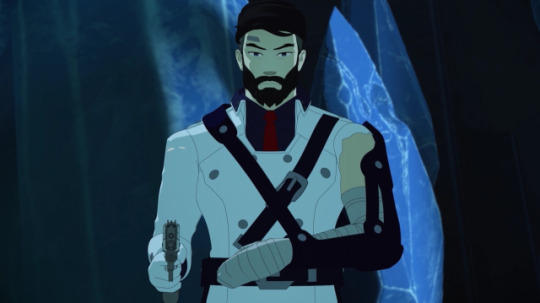
The finale of RWBY Volume 7 has finally pushed me to write SOMETHING. It isn’t that there wasn’t anything before in the other volumes, but this volume unleashed a torrent of emotions that I can not even begin to touch on. With Atlas left in the balance, and a raging debate about right or wrong, I felt now was the time to get this out of my head before in consumed me.
And the best place to start is with General James Ironwood, or resident Tinman with no heart. I think he desperately needs a character analysis to really put his actions into perspective. And I need to ramble, of course.
The first thing I want to do is really give an outline for his character type, and this has been obvious since he first showed up in Volume 2. Even at this time, we get an obvious introduction to the unquestionable loyalty of Winter and his main soldiers. More than that, we get a sneak peak at his superiority complex, and it only grows as time goes on.
Follow Orders. It was the theme of this volume, but it was hinted at back in V2 and other interactions between him and his subordinates. This is a huge red flag when RWBY and co come to him in Volume 7. Ironwood has surrounded himself with Yes men, people who only follow orders and never once question them. It is a dynamic theme throughout this volume, about controlling and crushing down your emotions to follow orders--or manage your semblance? Winter started eluding to this back in V3, which really set the stage for her and future Atlas soldiers.
He is RIGHT. This is important. He demands that his subordinates follow his orders without question because he thinks he is right and will always be right. And he never once afforded Ozpin that same loyalty, trust, or authority. Since day 1, he was constantly questioning Ozpin’s choices, even though HE was the subordinate to Ozpin. He thought differently from Ozpin and could never accept Ozpin’s ways, nor listen to them. He expected the council, Ozpin, and his soldiers to follow him without question and he truly, honestly believes he is right. This is scary, especially when you compare him to Ozpin, but I will get to that in a moment. The big point is that people who are so sure that they are right, even if they are dead wrong, are the scariest adversaries.
What we have here is a narcissist with a superiority complex who can not accept that he is wrong. He was unbalanced since he came into the picture, and Ozpin knew it. But here is where things get interesting.
Ironwood condemns Ozpin’s choices for keeping things secret and not sharing with the world everything. And, yes, Ironwood does the EXACT same thing. The difference here is in intention. Ozpin’s purpose was to protect the people and ensure that as few people died as possible. Ozpin’s choices were not based on control or the need to be RIGHT. They were based on experience, a bit of fear, and concern for the people he needed to protect. To Ozpin, sacrifice on a great scale was never an option. He tried his best to make sure that the causalities were as limited as possible. A difficult thing to do, given that hunters and huntresses were constantly fighting Grimm and such. But creating a mythos around the Maidens and eliminating Salem from history allowed him to save many many lives. And I can guarantee that he attempted what Ironwood planned to do, at least on some levels, and met with staggering deaths.
Ironwood, however, is keeping secrets to keep control and out of fear. He needs control, and he is frustrated that people do not agree with him automatically. After the fall of Beacon, these traits became enhanced to an unbelievable level. We see something else surface, though: Ironwood’s ability to manipulate people and be charismatic. Ironwood is looking to survive: for himself. He will, manipulate others and sacrifice millions of people’s lives to protect himself, though he clings to his mantra of “it’s for the greater good.” It will become the sign on the wall of the slave labor he creates. “For the Greater Good”.
Back in V2 and V3, Ironwood showed his ability to be both charismatic and manipulative. His subtlety in his manipulation is a statement to his rise to power. He puts himself into the position of a Father Figure to lure in the people he wants. It worked with Winter and the Ace-Ops, which is why they are his right-hand yes men. During Dance Dance, he was praising Ruby and fueling her admiration for him. Even when team RWBY came to Atlas, all his actions were calculated to manipulate the team into trusting him. Unfortunately, his actions never really lined up with his words, which was why the team was on edge. That is for another post ^_^
Another thing you can do to really get an idea for the type of person Ironwood is, is by looking back to the round table discussions orchestrated by Ozpin versus Ironwood. Ozpin was constant in listening to his people, sometimes taking ideas from them, and allowed them to question him--even yell at him. He was patient and understood what they were trying to say. He demonstrated this Ironwood and Qrow the most.
You would never see that kind of discussion with Ironwood. RWBY and co are new to the scene and it does throw him off. You can tell he is trying not to pressure them too much because he knows they are not on his side yet. Hooking them up with the Ace-Corps and Winter was a move to help sway them more, a subtle kind of brainwashing tactic that never worked on RWBY. Thank goodness!
If you think back to the things we have learned throughout the series, all the people we have met, you will find that all of Ironwood’s traits align better with Salem, Cinder, Jacques, and Adam. All of them have this hunger for power and/or control, all of them are trying to protect themselves and increase their control. All of them use a level of manipulation and none of them really cared about the damage it would do to others. Ironwood might be a little better because, at first, it was something he kind of thought about. Kind of. He had trouble relating to the idea that protecting more was better than protecting less, and it seems that he had been struggling to find his heart since the beginning. I do think he has a chance to come around.
All this comes around to why his plan was not only a bastardized and twisted version of what Ozpin was trying to accomplish, but why it was a horrible plan to begin with. Two words:
Volume 3.
Ironwood’s idea of telling the world about Salem is going to be the hair that broke the camel’s back for the world. Take the Fall of Beacon and magnify it to a million times, happening all at once all over the world. Okay, I will be a bit more fair: half that number, because there will be three groups of people after his big announcement. Those that believe him and panic or immediately try to sign up for Salem’s army, those that don’t believe him, and the very small group of people that will stand by and fight the good fight. And to those who would point out that people rallied upon his message to the people of Mantle and Atlas--they were already in the grip of madness as Grimm were breaking down the unmaintained walls and killing people. People were in the grips of fear and panic ALREADY and thus clung to his encouraging words. The people around the world are not in a panic-stricken moment. They are peaceful and calm.
Now, Atlas is a country with very strong military and technology, isolated and far away from all the other countries. Despite the strong military, it is limited in number. Who will decide what kingdoms and towns to save? How will they decide it? Well, history in our own world has outlined that pretty well. Ironwood, since he claimed martial law, would be the soul judge and jury on who to save and who not to. And it wouldn’t be long in coming before he will need to demand some kind of “compensation” to continue that “protection. Kind of like the mafia, gangs, and yakuza, etc have been doing for hundreds of years on this side of the screen. He wants everyone to rely on Him and his military might. He wants to be the hero. He wants to be a God.
And he will need people to make that happen. The factories will be working night and day, little breaks, and the big sign of “For the Greater Good” in big bold letters hanging over the heads of the people who were not of high enough office to keep themselves out of the slave lines. This isn’t some grand head canon, this is history. He is setting himself up for this.
Millions of people will die. Only the elite few will sign up to get under the protective wing of Atlas. The rest will stage a revolution to bring down the Iron Hand of Ironwood. Divided so thoroughly that it will take centuries to bring them back together. Everything Ozpin has been slowly building up and working for will fall apart in the blink of an eye.
See, that is a big point. It takes one small thing to divide people and make them fight amongst themselves. It takes hundreds of years of careful planning, movement, and cooperation to bring the human race (and Faunus!) together.
Ozpin’s priority had always been the people, however, I think he was once in Ironwood’s shoes. I am pretty sure he tried everything, including this, and saw it fail horribly. Ozpin has, after all, had centuries of experience in fighting Salem. The delicacy of the human mind and heart are something he is well acquainted, and I think he already knew what type of person Ironwood was, or at least was becoming. Near as I can tell, the big reason he kept Ironwood on was because Ironwood had the resources and technology he needed to keep his plan moving forward.
It was already stated in the show about how Ironwood would bastardize the idea of the floating city. Using the concept to create a global communication that could be independent for each kingdom seems like a great idea, and on the surface it is. It ignores the fact that only one kingdom would have full control and access over that system at its most important base: Atlas. And how that would turn out was well simulated by Watts.
I could go on and on about this, but I want to leave it with one final quote that sums up why Ozpin was almost successful and why Ironwood fell so fast.
"It is necessary for a prince to have the people friendly, otherwise he has no security in adversity." (Niccolo Machiavelli)
Ozpin worked hard to maintain the peace and goodwill of the people. Ironwood, so far, has not. Definitely having robot sentries on every corner and forcing an embargo on a kingdom that can not easily generate its own resources, as well as hording those resources and preventing necessary repairs and aid to those people--those actions all show that he is not keeping this important aspect of ruler ship.
(random side note-- it is interesting that despite all the quotes from Machiavelli, everyone ignores the fact that he himself constantly harped on and on about keeping the people happy and on the side of the ruler rather than the Nobles. I felt this applicable because Ozpin did not really care about the council or their rules, he cared about the people. Ironwood, while not caring about the council, either, did not really show any care for the people. You should definitely at least have ONE of those on your side, but Machiavelli would strongly encourage any ruler to have the people no your side moreso than the Nobles. The Medici family, especially Cosmos, was his biggest example of why this worked.)
Enough about Ironwood, that poor, damned soul. Love his character and how they did this.
51 notes
·
View notes
Text
Game concept: A Single-Player AAA Marvel’s Iron Man
I’ve been playing a bit of the new Avengers game this past week, and... boy do I have so many gripes about it. The campaign is actually pretty competent and it’s a great re-interpretation of the characters we know so well (based on what I’ve played so far), but the game mechanics and the “live service” multi-player angle just ruins it all. There genuinely is a lot that’s great in this game, but there’s also just too much bullshit in it that just repulses me, which got me thinking: what if we could take the good in here and strip away the bullshit? Specifically: what if we had a proper, narrative-focused, single-player AAA Iron Man game? I’m aware that Iron Man already has a solo VR game, but that’s not quite what I have in mind. The concept I have in mind is much more akin to Marvel’s Spider-Man (which is pretty much the gold standard of a superhero game imo) - a proper single-player experience starring the beloved Tony Stark.
As a character, it’s pretty easy to visualize how Iron Man could be gamified - and in fact, I’d argue that Marvel’s Avengers already does this pretty excellently. Playing as Iron Man is genuinely exhilarating and a lot of fun in Marvel’s Avengers (but terrible level design ruins it), and it actually *feels* like I’m playing as a superhero with a superpowered technological suit. Flying about at high speeds and firing at enemies with a variety of ranged weaponry, for example, feels genuinely fresh and is a lot of fun - it’s also quite distinct from traditional action-adventure superhero games where combat is more heavily melee-focused, such as Spider-Man or Batman. Iron Man’s gamification in Marvel’s Avengers is thus, in my view, highly palatable. It feels authentic and true to the character - it’s a nice touch, for example, that Iron Man can easily switch between multiple weaponry types, including repulsor beams, lasers, and rockets, each of which then alter his moveset accordingly as well. It’s also extremely cool that his ultimate move allows him to enter the Hulkbuster armour - which honestly is just badass as hell. All these are very strong points in favour of a well-designed Iron Man game, and I imagine that a proper single-player action-adventure game without the constraints of live-service bullshit and multiple playable characters would be able to develop this gameplay even further.
Apart from the sheer fun of playing as Iron Man and wielding the plethora of high-technology superhero weaponry in his arsenal, good action-adventure RPGs also require a satisfying and rewarding trajectory of progression over the course of the game. Ghost Of Tsushima, for example, progressively grants you more and more combat options which cumulatively feels incredible because you feel a genuine sense of development and growth, and the game aids you in feeling as if you are becoming a more powerful samurai or ‘Ghost’. This type of progression is, again, very easily visualizable with Iron Man - whose entire character is built upon the development of more weaponry, more functions in the suit, or even brand new suits altogether. Much like how numerous melee as well as web-based combat options are unlocked progressively in Marvel’s Spider-Man, a single-player Iron Man game can easily provide progression trees built on the principles of unlocking additional functions, additional weaponry, or even developing new suits (e.g. from Mark II to the Mark 50 to the Mark 85, to the Hulkbuster, and I’m sure there’s a lot more of this from the comics too). Separate progression trees could, for example, unlock refinements to functionalities in flight, ranged combat options such as rockets, lasers, and beams, melee combat functionalities, stealth-based functionalities and defence/healing-related functionalities, among others. At key story moments, whole new suits (such as the Hulkbuster) could be developed, providing both gameplay and narrative growth that if done right would be extremely captivating.
I’d also argue that Tony Stark’s character is one that lends itself very well to a compelling video-game narrative - his popularity in the MCU speaks for itself. I’m no expert on the comics, and my knowledge of the universe comes primarily from the movies, so I’m sure someone else could be far more capable than me of coming up with an interesting original Iron Man story to tell in a videogame. I can offer some vague ideas, however - for example, how about an Iron Man story with The Mandarin as the central antagonist? Villain and overall plot aside, I think there’s a lot of potential for a character-focused story centred on Tony Stark. The MCU’s rendition of the character, for example, gave us a highly nuanced exploration of an egoistic and self-centred billionaire who hovers between selfishness and selflessness, who struggles with anxiety issues over run-ins with alien invaders, and who struggles with his obsession over his suit. Despite his imperfections and despite having character traits that most individuals would find repulsive, Tony Stark is a character we all just can’t hate. If anything, we absolutely adore his snappy wit and charisma and we absolutely adore the selfless hero that lies beneath his self-centred exterior, and a video-game version of this would surely be a lot of fun. I’m sure there’s a lot more that can be meaningfully explored with this character in a videogame - I mean, we already have a billion versions of Spider-Man, so how about another version of Iron Man?
To be clear, Robert Downey Junior’s performance of the iconic Tony Stark is in a league of its own, and despite his best efforts, Nolan North - one of the most talented voice actors, if not *the* most talented voice actor, I might add - just can’t quite match up. Realistically, I don’t believe anyone will ever surpass RDJ’s portrayal of Iron Man. For me and for many others as well, RDJ *is* Iron Man. In an ideal world, I’d kill to see an AAA Iron Man video-game voice-acted and mo-capped by RDJ himself, but I don’t think that’ll ever be possible within this universe, given how prohibitively expensive it’d be to hire him (besides, it seems like he’s genuinely done with the character). Still, I think Nolan North does a serviceable job, and I’d be perfectly accepting of an alternative interpretation of Iron Man played by Nolan North. Even if no one can match up to RDJ, I can’t think of a better voice actor than Nolan North to do a videogame version of the iconic character.
tl;dr: Picture this: an open-world, single-player, narrative-focused videogame for the PS5 in the vein of Marvel’s Spider-Man, but starring the iconic Tony Stark and exploring the deeper nuances and conflicts of his psychology, as well as a gripping and bloodcurdling narrative involving his struggles against The Mandarin. Game progression will be built around the development and upgrading of his suits, and game-play will be similar to Marvel’s Avengers, but far more polished and elaborated upon. I don’t know about you, but I’d pay good money to play this game if it were ever made.
So... if someone at Marvel somehow sees this, could you please make this happen on next-generation consoles? No need to give me any credit, I honestly just want good games to play, and I’d absolutely, absolutely, absolutely love to play a well-made Iron Man game.
#game concepts#marvel#iron man#tony stark#avengers#ps4#gaming#games#playstation#game ideas#videogame ideas
2 notes
·
View notes
Photo
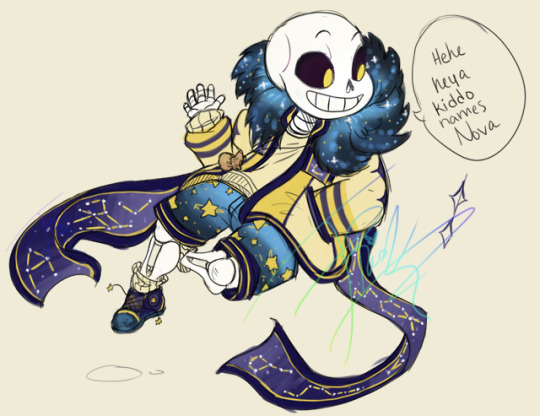
🌼Good morning everyone and a happy Tuesday to you all! I had a lot of people ask me about my Outertale on Discord. That beat out pretty much all the other options on the poll so here we go! This is one of the larger ones because I had a lot of fun putting some of my favorite sci-fi concepts into this. I am a huge SG1 fan so you can definitely see that reflected. I admittedly am the fantasy genre girl so any ideas are welcome! I just liked the idea that the monsters in this were more than just typical monsters. DO NOT REPOST MY WORK WITHOUT MY PERMISSION IT IS NOT FOR YOUR USE. IF YOU LIKE MY WORK PLEASE REBLOG INSTEAD! It helps me so much! It makes such a difference.💙If you want more of these just let me know! It’s the only way I can gauge interest! Outertale Alternate “Nicknames” Info:  Sans: Nova- Nova is the trickster though he is mostly associated with that of Loki. Loki is described specifically as “Playful, malicious ( ok maybe not that one), helpful, and nihilistic.” He helps others in a kind of goofy over the top way. He just doesn’t take much seriously. Nova is one of the youngest. He acts very childish at times coming to question how long he has been among the pantheon. Some argue his many centuries gave him a nihilistic outlook on life or that he is too young to understand the true ways of the world. Not to say that Nova can’t be serious but he is pretty laid back. It’s one of the reasons unlike the others he doesn’t really keep his cultural ties in his design. He should have more Norse in it but nah… varsity jackets are cozy right? I mean he is wearing star shorts for star’s sake. When asked about his job he mentions, “Hey, there kiddo. Nice of ya to drop by. Been up to? Heh well got a “new” job which is pretty cool. Not as cool as Pollux but I help arrange stars. Ya know, like the ones you see in the sky you can make pictures out of? I think you humans call em… constellations. One time I made this giant whoopee cushion one. Then I lost ma job. Got a second chance though. Andromeda’s constantly watchin me. hehe no harm done though.” Both Pollux and Nova refer to each other as brothers but it is unclear if they are biologically related. Their abilities and strengths are nearly opposite and their mythos even more so. Papyrus: Pollux- The presumed older brother of Nova. Pollux is associated with Egyptology specifically wisdom. Pollux tends to be the opposite of Nova in that he takes his job very seriously. Once on earth, he was known as Thoth gracing humanity with a mechanical and architectural knowledge that astounded the world. His mind and intellect put him at the forefront of innovation making him one of Capricorn’s best and most trusted advisors. He enjoys testing the mental prowess of others using puzzles and riddles of his own design. Unlike canon Pap, Pollux cares more about balance in life. Something his younger brother seems to lack. Not all work and not all play. He is kind, helpful, and willing to give advice to anyone that is looking for it. To the little human Frisk, he is a good mentor and teacher. (Pollux has made it his pastime to create a series of challenges to prove a humans worth. If they pass then they are able to speak/ see them. No one has managed to prove themselves.) Undyne: Andromeda- Andromeda is not different from canon Undyne as she embodies the Mayan mythology. She is most closely associated with the feathered serpent Quetzalcóatl. A deity of wind and rain. Also known as life-giver. Though Andromeda tends to harken back to her more aggressive roots she has a deep respect for the King and acts as his guard. Just like Pollux she too acts as an advisor, though more on matters of security than strategy or mechanics. Such a position is where she first met Elara and to this day the two are inseparable sharing their very different cultures. Her favorite kind of anime to watch are mech-based. Alphys: Elara- Very similar to canon Alphys just as this version of Undyne is. Alphys is based on Sukuna-Biko-Na (少名毘古那) or the Shinto god of medicine and rain. Elara is still very much a scientist and one that has a unique fascination with living things. Everything from the planets, to humans, animals, and plant life. She particularly enjoys spending time in her private greenhouse creating and taking care of all of the plant life. Before the monsters were forced to leave their place among the humans she was able to collect all the DNA of the plants and animals on the planet. They are stored in a kind of ark in which to preserve them if anything threatens their existence. Elara is very traditional in her work as her medicines are derived from her magic as well as herbal substances. She is very curious however as she is not allowed to interact with the progress of humanity but rather watches from afar. This is where her love of anime takes hold. Her favorites are ones like Sailor Moon or any type of magical girl anime. She will sit with Andromeda and watch them for hours. Her demeanor is very shy at first but once she opens up she will be a friend for life. Asgore: Capricorn- The head of the cosmic pantheon he is the King as he is in the original. He is associated with Celtic mythos though he has taken on many pantheon roles in his lifetime. Ambisagrus, a god of thunder and lightning, Ancestor God, Sky God, God of Wind, Rain & Hail is what he is based on. One such role is that of Zeus whose main symbol is that of lightning and thunder. Just like the Zeus of mythology Capricorn is constantly debating his involvement with humanity. Whether that be to stop their technological advances or aiding in their lives. A large portion of his time was spent with his subjects not so much his wife Aurora who is the jealous type. Capricorn is not a ruthless leader but he does know that sometimes hard decisions must be made. Just like UT Asgore, he is kind and benevolent, however, he has a temper if you make him angry enough. His magical abilities lean more toward lighting then fire but he has that ability as well. He tasked Elara to watch over human development should a problem arise. Toriel: Aurora- The Queen to Capricorn she is known to be easily jealous. It would explain why Zeus wife Hera also shares these traits. Her Gaelic deity tie is that of Arianrhod a goddess of the moon and stars. She creates life from the stars she creates sometimes causing them to take a form of their own. They are almost like living constellations. Some say that the Queen made such life to combat her own loneliness which her Son and Husband spent time away. In addition to the stars, she is also known for being a loving mother and caregiver. In her time on earth, she used to watch over and protect children and their families. Aurora though previously jealous of her simple in the universe has come to accept and embrace it. She is kind but rather overprotective. Anyone that forsakes life will feel her wrath. Muffet: Umbra- Umbra is associated with Hindu mythology as a goddess of wealth and prosperity. Though earthly riches do not concern Umbra she still has a taste for the fine silks and gold that she once had on earth. A little about the goddess that she represents: Lakshmi’s name comes from the Sanskrit word laksya, meaning an aim or goal. She is the goddess of wealth and prosperity, both material and spiritual. Unlike UT Muffet, Umbra also focuses on spiritual wealth. Peace of mind. She is ever the optimist even when things do not turn out to go her way. In times of need, she is called those in the struggles of self-worth trying to bring them into a different understanding. There have been many a time when Umbra calms Capricorns quick and rash judgments, much to Aurora’s displeasure. Just as with the rest of the pantheon she is kind and helpful even with her yearning to return to the people she so loved before they were forced to the outskirts of the galaxy. Grillby: Helio- Helio derived from the sun is my OT Grillby. He out of all the characters could care less about either being a deity or an observer. He is known to be at a middle ground. He would rather live his days running a social establishment but during his time on earth, he was known for his magic. Originally he was the right hand of Capricorn being depicted as a war deity for his fiery nature. He was the general of grand armies. His armor is something he hung up long ago but if called into court he will wear it once again. Its design is very reminiscent of Roman centurions. Though depictions of him are curious since his name back then was referred to as Merlin. He was best known for his magic and alchemy and the concoctions he made during a period of time far lacking in imagination. Just like Nova, Helio tended to interfere far too often in the affairs of man though noble in purpose. He tends to be outcast among the pantheon for his past conduct but he is content in his lab mixing crazy concoctions. Everything from love potions to disguises. His forte is all about alchemy and magic. Asriel: Azicree (Azi)- Azicree or Azi for short is the Crown Prince. By monster standards Azi is still very young, however, he has lived for far longer than any human can fathom. His mother used to shelter him until he begged for his father to let him prove himself. He still acts like a child always curious and desiring some form of exploration. Much to Capricorns dismay Azi enjoys spending time with Nova and the two become pranksters in general. He tends to not do as he is told, which is why they are in this mess in the first place. His reckless behavior had him appearing to a human that begged for his salvation. The matters of life and death are ones that are not to be messed with. Those that do find their souls being tainted for all eternity turning them into something other than just a monster. 9X is an example of such tampering. Azi does learn his lesson and begins to try and shape up to be a worthy successor to his father if such a thing ever did come to pass. He studies off of all those he knows especially Pollux who is more than happy to share such knowledge. His associations are nonexistent since he was born after the times of gods. His abilities seem to be mimic based. He is able to learn about abilities and use them at will. It is rare that monsters have children and as such Azi is the little prodigy child even though there are many times he just wants to be a kid. He makes friends with Frisk very quickly and learns a lot from the human visitor. Gaster: 9X (I can’t even)- 9x (can be pronounced NYX or Nine-X) is the Gaster of this universe. He is Capricorns pantheon counterpart. In essence the Hades to his Zeus. He is the monster that everyone thinks about when darkness takes hold. He is the one that associates with apocalyptic events such as Ragnarok. He is however not evil by any stretch of the imagination. He would be better suited to be called a god of chaos. He tends to reject the laws placed upon the rest of the pantheon regardless of repercussions. It’s speculated that both Pollux and Nova were a part of him and crafted into the monsters that are known today. Nova being his more devious side which Pollux is more his intellect and drive. He has been locked away for a very long time in a prison aptly named Tartarus. His abilities are space and time-oriented very similar to Nova which makes him difficult to imprison. He, of course, has been in his cell for quite some time and it is unclear if he actually has had a change of heart or using it as a manipulation tactic. The only one he speaks with on occasion is Azi wanting to learn more about this planet they all used to call home. It is information that the others tend to not speak of. His father more so as he is afraid it will instill a yearning in his son. 9X’s genius is on par with his godly abilities such as creating artificial intelligence. Something that is not considered life. He uses Azi as a template for this new program… FLOWEY- F- Friendly L- Life-like O- Operating system W- With E- Earthbound Y- Yearning  F.L.O.W.E.Y was created by 9x and Nova with Azi as a template. He is a charismatic AI who was originally created as a helper as well as to teach the Prince about their planet of origin. Unfortunately, Flowey does not have the same reservations about disobeying his father as Azi does. Even going so far as to integrate with key and vital systems in The Capital. Flowey is not evil he just is driven to be the best help he can without regards to any type of consequences. He also feels abandoned by Nova as he was not only his creator but also his closest friend. It was why he was made. To be a companion and friend.  He helps Frisk meet and learns more about their existence. He acts like a companion. However, when Frisk becomes friends with Azi Flowey’s AI goes haywire. He begins to feel emotions he is not technically allowed to such as jealousy. This causes him to try and eliminate those threatening him which in this case would be all the monsters. Eventually, Azi attempts to program himself into the interface changing its initial programming. Some of Flowey’s previous versions:    Blookie: Nebula Riverperson: Omni Gerson: Quasar The Ursas: Ursa Major/Minor Greater Dog/ Lesser Dog: Canis Major/Minor  Character Origin/Mythos: Sans- Norse (Trickster)
Papyrus- Egyptian Undyne- Mayan Alphys- Japanese (shinto) Asgore- Celtic Toriel- Celtic Muffet- Hindu
Grillby- Medieval (Merlin) Asriel- Celtic through lineage Gaster- Greek/Roman Blookie- Western Guard dogs- Constellations (Native American) Riverperson- Greek (Charon) Gerson- Chinese (Divination/ wisdom) Background and Context: A long time ago there lived beings of great power. They could bend space and time with a simple thought and bring life to their creations. These were the gods. Ones of great benevolence but also great and terrifying power. Humanity, a primitive race just starting to understand life itself, became their focus. At first, their interaction was very rare only occasionally appearing to help but as time went on those interactions became more drastic. Their assistance and knowledge were seen as godlike to these humans. They would bring gifts and offerings to their new deities in hopes that they would look favorably upon them. That they would impart their wisdom and magic if they were pleased. In time this became more and more of a tradition. A religion built upon pleasing these deities so that their lives would be far improved but this became a conundrum for the beings. Some remained benevolent and helpful while others become greedy and wrathful. The power began to go to their minds corrupting their souls. These instances were written down in variation by the humans making up grandiose stories of fiery chariots and jealous gods. Thus mythology came into being for humanity. A way to explain the things in which they did not understand. As with each religion and deity, the monsters each became associated with a specific culture or mythos. Some being pinnacles of their pantheon and others being lesser deities molded to suit a specific task. These monsters rarely interacted with ones of their own kind but as power shifted some of them took on roles of others. One monster could have been the god of war in Greek mythos but end up also as the god of thunder in Norse. There were no limitations to their influence. One such “deity” was that of the trickster. A monster that tended to be rather childish in his ambitions jumping from pantheon to pantheon looking to lighten up his other “deities” stern demeanors. The monsters began to pull away leaving their presences in name only and occasional help but this was short-lived. It caused problems, war, destruction, and feuding powers sadly began to use their civilizations as almost pawns. Their meddling almost destroyed that which they wanted to originally protect. Absolute power corrupts absolutely. The “gods” faded from existence only being remembered in myths and legends. The great prophecy of the Norse. The architectural marvels of the Egyptians. Now they reside in the furthest reaches of the galaxy. They spread out among the stars but a group of them resided in a Capital of sorts. A station at the edge of the Universe. One which no human could ever reach. The Humans Impressions: When the monsters left the humans to their own devices they worship continued long after. Eventually the magic and the miracles that had once been performed faded into history. The monsters were all but forgotten unless mentioned in mythology or scary stories. The humans never harbored any animosity toward them since they no longer believed in their existence in any form. They only understand what their ancestors depicted them as. The monsters as well don’t really have anything against humans either. All in all, they just go about their jobs and enjoy the universe, helping from time to time discreetly if need be but never showing their faces. Main Plot Synop: The plot to Outertale is very simple as it is more based around the world than it is the actual plot. It is very similar to that of the regular UT timeline with some notable differences. Once the humans reach an age of technological advancement they begin to spread out and search the stars. Some of them encounter monsters which they mistake for aliens (hilarious enough. I mean Jerry looks like an alien.) They begin to build colonies living more and more outside the reach of their own galaxy. Humans, however, tend to turn on their own creating factions within the space colonies. Some more prosperous than others. Frisk’s colony was one such beast being cut off from the other colonies as a drifter. Unfortunately, Frisk’s family was nearly non-existent and being stuck on a space colony was little to be desired. After seeing a streak of fire slamming into the outskirts of the colony. Frisk decides to investigate. They have always been the curious type disobeying orders and questioning everything. The colonies outer and more dangerous regions became their playground finding old pieces of technology. Eventually, they stumble upon a crashed ship. One that It seems too damaged to be used but it’s nothing like they have ever seen before. Everyone else on the colony considers it to be cursed.  The strange runic language is confusing but Frisk finds that there is one lone computer onboard that seems to still function. It flickers with a bright yellow light showing an almost pixelated Flower with a =) face on the screen. Over the next few days, Frisk returns to decipher the runes with the help of their new friend which they find out is called Flowey. It is a project that the curious human enjoys and for once it is nice to have a friend. Eventually, the runes are deciphered claiming some sort of teleportation capability. Once Frisk is close enough the system fires up on its own sending the human straight to the monster Capital on the farthest reaches of the universe. A place that no human has ever been.  The rest of the story is an exploration of this new environment. Frisk befriends the monsters who don’t attack first. They actually mostly want to engage with the human showing off their ability a little bit. A part of them misses the previous worship. Nova seems to take a particular interest in this new human especially when they befriend Azi. They work to help shut Flowey down only for Azi to impart his knowledge on the interface helping it understand. Frisk has nothing to return to so they stay with the monster and become Azi’s human tutor so that one day maybe the monsters can return and live side by side the humans once again. Both Azi and Frisk are almost like siblings coined the star children.
#sans#undertale#outertale#friskys multiverse#Nova#outertale sans#outertale cast#undertale universe#undertale au#Sans variation#space#space aesthetic#galaxies#concepts#friskys outertale#my art#lore building#world building#I do love outertale so I had to make my own version!
193 notes
·
View notes
Text
Codism Manifesto
By Pamviles
Ⅰ Background
When I was eighteen, I suffered from a mental disorder for half a year, and it was during this time that I discovered art. My philosophy also began to take form during this period of time. I had read extensively into the fields of philosophy and science (especially quantum physics), Plato's cave enlightens the imagination to unknown spaces, Descartes’ demon destroys previous structures of philosophy to rebuild a new system and Wittgenstein's mirror of the game captures the essence of philosophy through language. The centuries-long debate surrounding the nature of matter as either a particle or a wave, and its reflection on the real world has perpetuated through the theories of Einstein, Bohr, Heisenberg, Schrodinger and others. As well as the fragility of knowledge itself, all the above helped me re-understand the world. In university, I spent three years creating my own philosophy, I used ‘imagination’ as the basis of my philosophy, through the form of Dialogues (The Dialogues of Mr. Walter and Mr. Galson, a total of seven articles, included in my book ‘Drifting: an artist's madness, sex, art and philosophy’), involving questions concerning existence in reality, the possibility of god, the truth in history, the vanity of inspiration, time, and fate. All of the aforementioned are presented in my artworks. I believe an artist above all things should be a thinker, and to a certain extent, examine the dissionance of their thoughts through their own art.
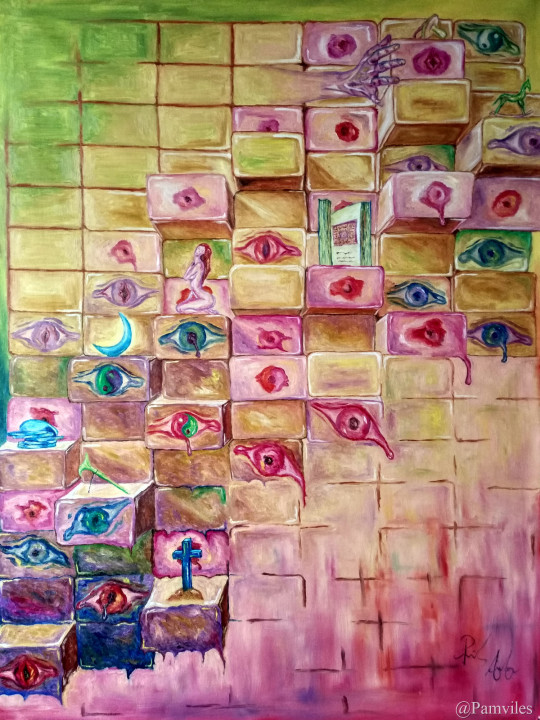
My early artworks refer to surrealism. The mystery and fantasy of surrealism is what led me into the realm of art. Surrealism is a means of elaborating dreams. It can break reality and bring reality back to a fantasy realm, distorted and merged with forms of the inner desires, struggles and pursuits of an artist. To me, the charm of surrealism lies in that it can fully show the inner world of an artist. But as time passed, I was no longer content with surrealist expressions, because if I wanted my art to leave a mark on history, I had to create something that had never been done before.
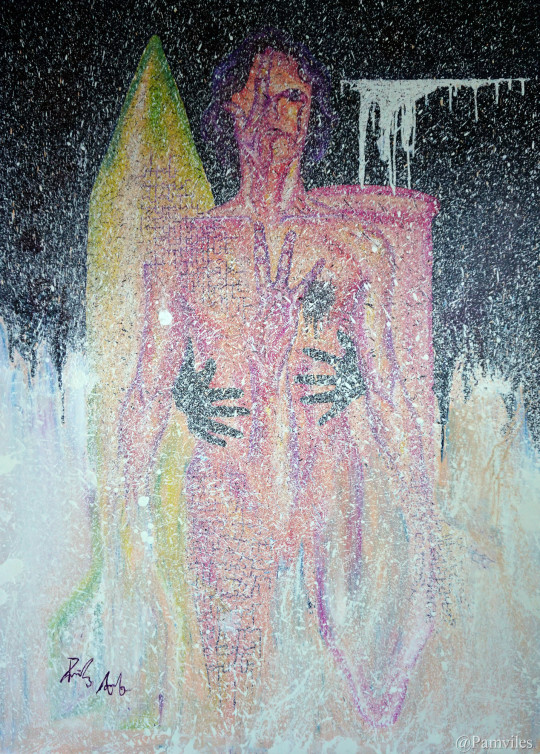
Since 2018, I have been rethinking my artworks. Using my educational background of mathematics in my practice, my current artworks incorporate the form of code as a major element of my art style. In fact, my early artworks also had an element of coding, but only in recent years have I gradually formed a theory of my own.
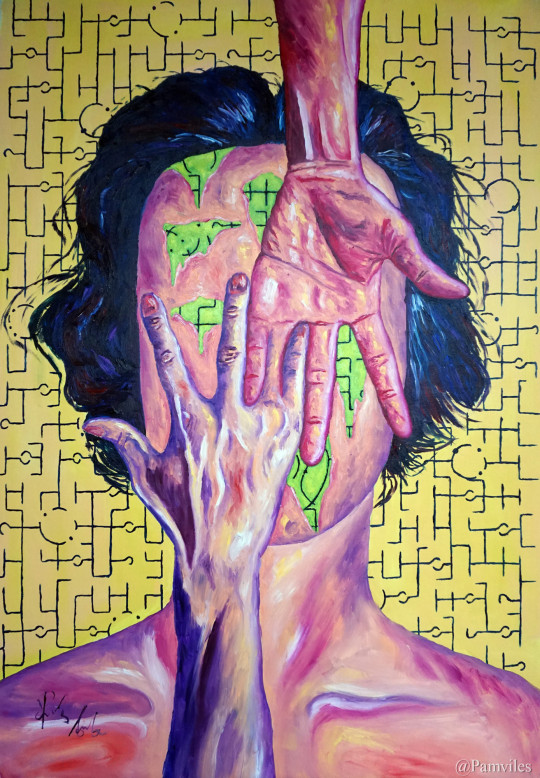
I was self-taught in painting while I majored in mathematics in university. The element of mathematics may seem to have no relation to art, but for me, mathematics is the basic explanation of how things work in the universe. Art, on the other hand, is a manifestation of unique human emotions and souls, the former being the cornerstone of reason, and the latter the ultimate sublimation of emotion. Both are important forms of human understanding and expression of the world. What kind of collision can be brought about by combining the two together? Integration or contradiction? I merge mathematics and art based on my own understanding of both fields and the reflection of the past torture and encouragement from these two. I hope to bring viewers to new thoughts about math and art.

To me, painting is like a colorful shell, and theory is its soul. After two years of summarizing my own ideas of art, the time comes to solidify the first draft of my Codism Manifesto.
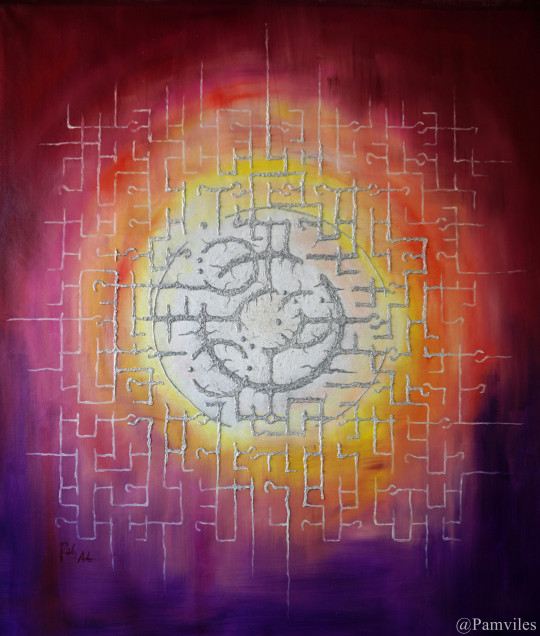
Ⅱ Definition
Codism in art refers to the recompilation of common language systems into new images or symbol systems by means of mathematics, linguistics, etc. and incorporating them into works of art. The compiled cryptosystem can be symbols, lines, geometric figures, color changes, cubes arrangement, etc. It is a rigorous system with regular rules instead of random, it hides the original information to be expressed in the form of codes. This cryptosystem needs to fuse with the created artwork. They are complementary and not independent of each other. It is precisely because of a variety of patterns that different cryptosystems can show, that it can be embedded into artworks and become an inseparable part of it.
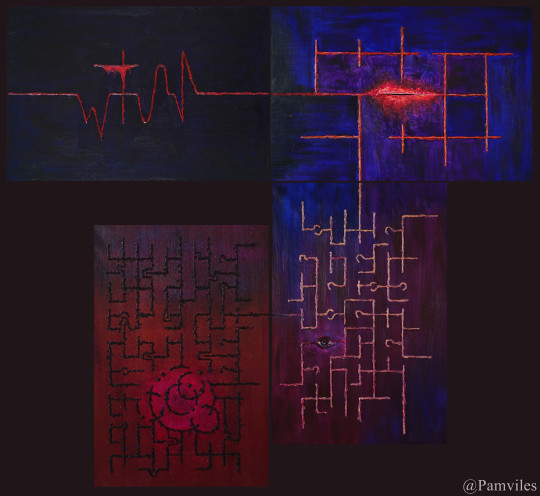
Ⅲ Meaning and purpose
1. Symbolic meaning
In the art of painting, you can often see the traces of symbolization, and use certain images or symbols to harness a concept or meaning. For example, people think of religion or death when they see the cross. There is also a certain symbolic meaning in my art. In addition to the specific objects in the painting, my code has become a part of the symbol. So far, I have created over ten code systems and integrated them into the artworks. Sometimes a painting is just one code system, and sometimes multiple codes are superimposed. The shape of each set of codes is different (some are lines, some are geometric, some are round deformations, some are symbols similar to hieroglyphics, etc.), because in different paintings, I will choose according to the theme of the painting, and it is because of the different forms of these codes, they have different symbolic meanings to the picture. Since these codes are formed through mathematical processing, and mathematics is the basis of all scientific and technological progress today, the presentation of these codes on canvas represents technology and science. The code itself is a hidden method, sometimes symbolizing secrets or unacceptable ideas or even a reflection of the virtual world.
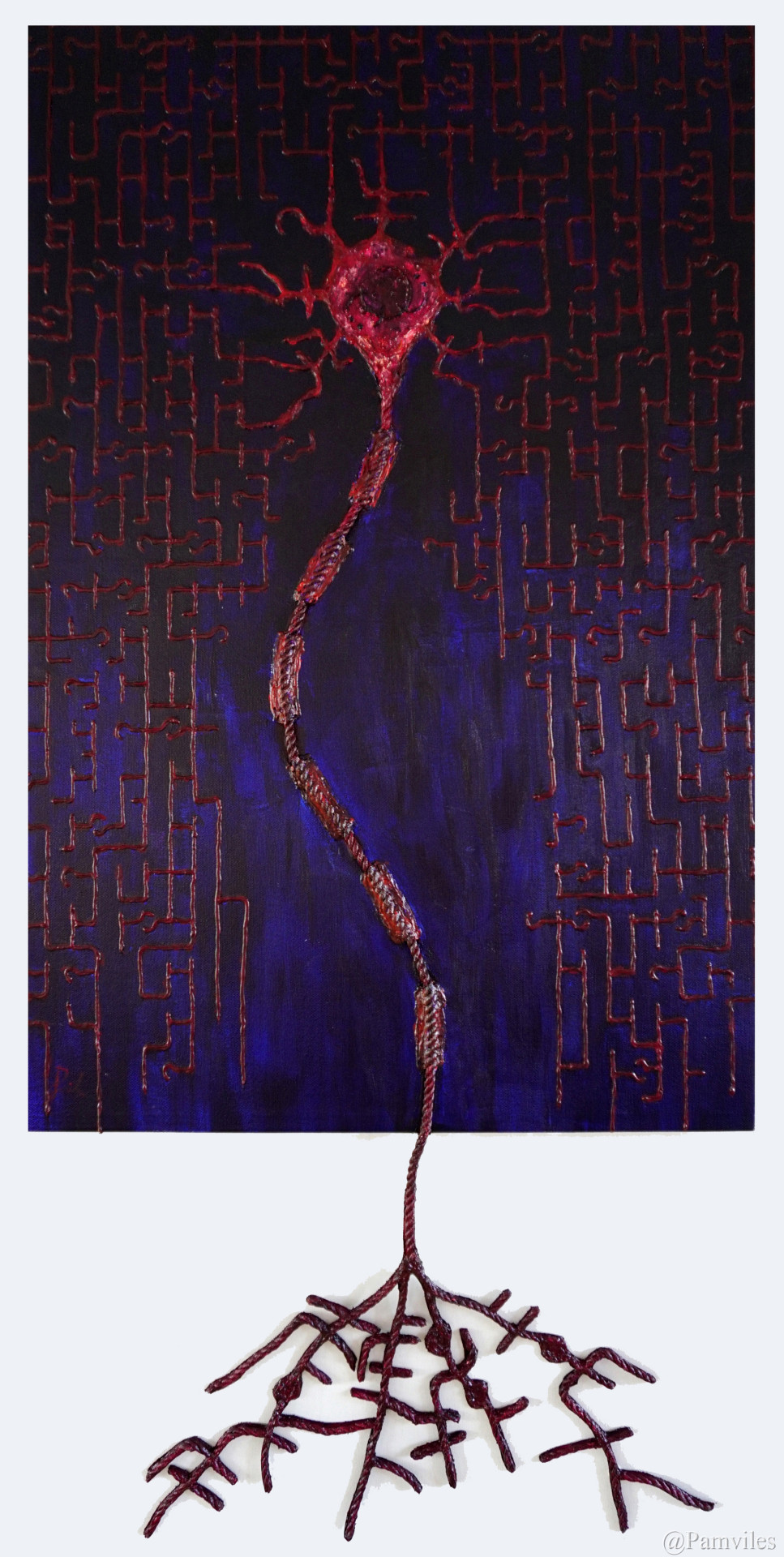
I could have presented numbers or mathematical formulas directly on the canvas, and even extracted a part of my Apm theorem to add to my paintings, but I think said approach is too blunt. Trying to combine mathematics and art by selecting some random symbolic elements of mathematics and forcing it into the picture would be reckless and rather dull-witted. The works created in this way seem to me to have no meaning of mathematics but a shallow representation, let alone apply any mathematical knowledge. Throughout my works I have to capture the essence of mathematics through my own coded system, because only in this way can I be more organically connected with the subject I need to express and integrate with the picture.

The symbolic meaning of artworks is based on the artist and the audience having a common cultural knowledge background. But in pure mathematics, in a series of theorems and proofs, no symbolic elements can be found. The world of mathematics is so pure that it only has logic and reasoning. And when this cryptographic code with mathematics is introduced into art, it is to a certain extent a betrayal of symbolism, and this is also one of the processes that will gradually appear in my works.
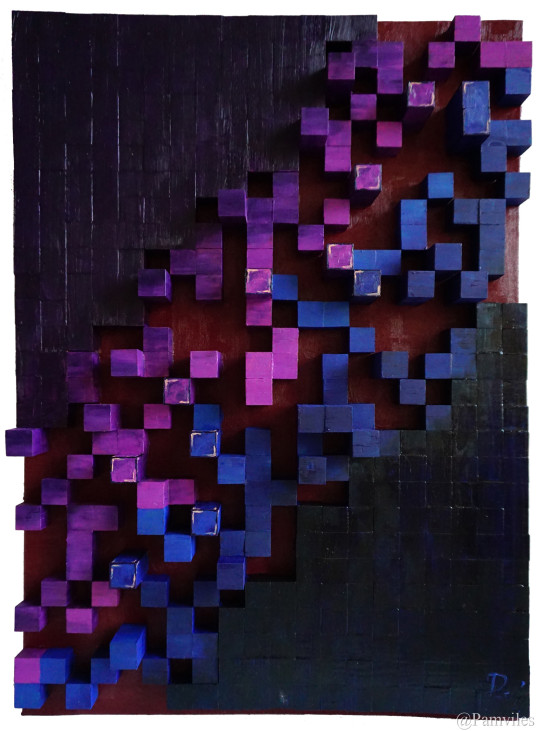
2. Words and communication
Before becoming an artist, most of my work was in writing. When I started to paint, I always thought about the difference and connection between painting and writing.
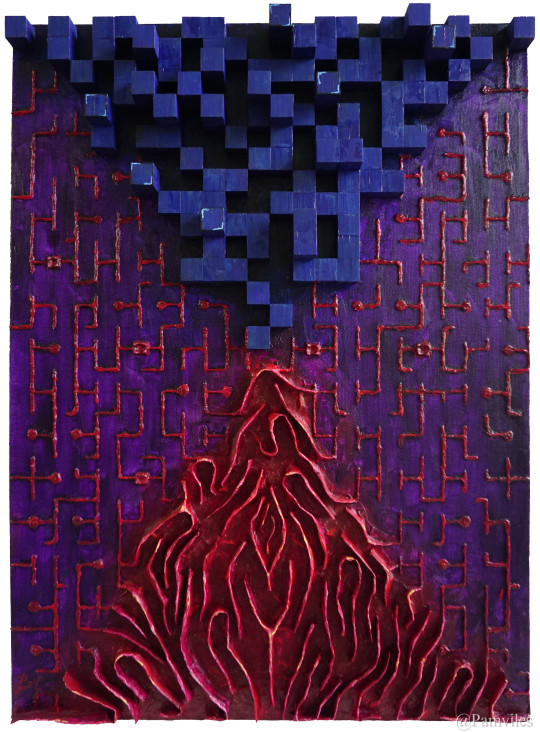
Reading a paragraph of words requires clear and organized thinking and time in order to understand the meaning in the text. In contrast, processing a painting can be scattered or even instantaneous. Reading text is like a narrow stream flowing, and it is single and coherent in time. It can only be understood by reading one word after another, as this is the brain's way of clearly organizing and making a single-channel sequence. But viewing a painting is like standing on the edge of a radiant lake, and the result is immediate sensory pleasure or other instant experience. The former is the perception of understanding, while the latter is a sensory experience. Words are constrained by time, yet it is the most ideal tool for expressing thoughts, because words (or language) itself is the basic way of thinking. The painting is an instant impact, and its viewing is not constrained by time. (Of course, to understand some certain paintings still requires time, but that would be a different subject.)
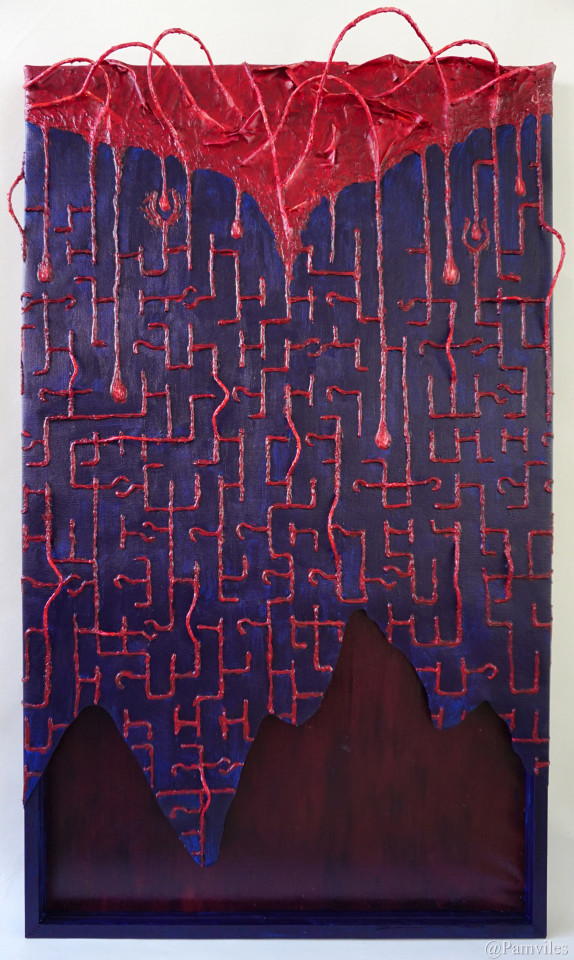
My code embeds the narrative and comprehension elements of text into the painting, which makes my work, not only have the immediate sensibility as the painting itself, but also implies step-by-step understanding. The existence of the code does not necessarily suggest that the audience needs to understand the story or meaning behind it, but work as a representative of the comprehension and revelation that can be obtained by reading.
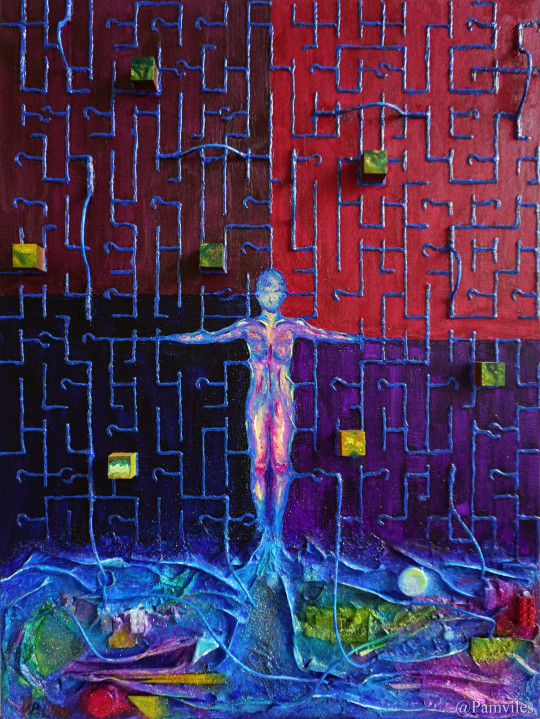
My code system brings a time-like depth of procedural understanding to the painting in addition to the visual characteristics of the painting itself.
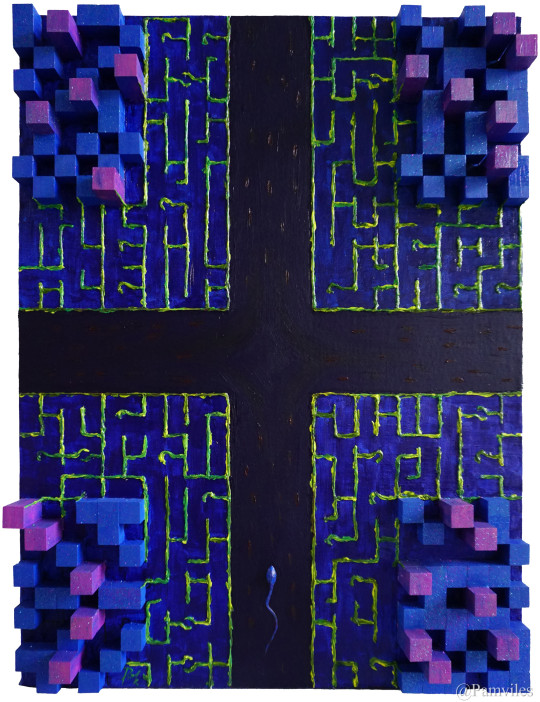
When a piece of art is presented, it is a non-verbal communication between artist and audience. It does not have a concise expression of information like verbal communication, and the information of the work may be transmitted unconsciously by the artist to the viewer. Since this nonverbal communication between the artist and viewer is unclear, not all audiences can receive the message.
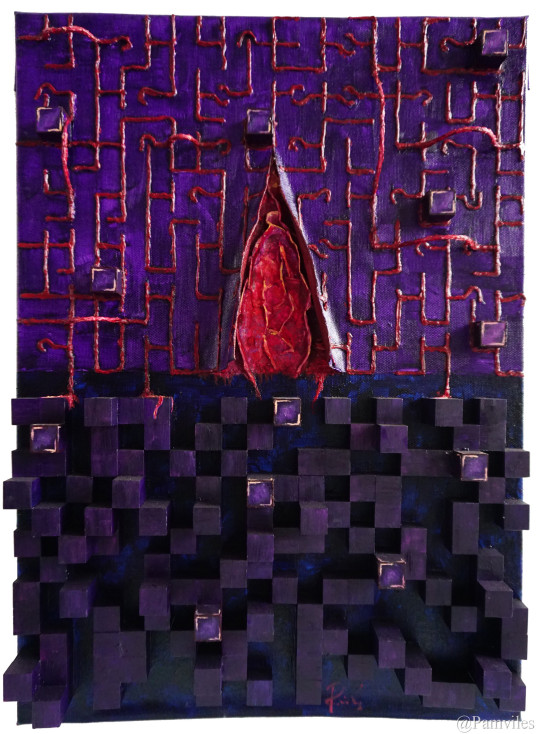
The most direct way to convey information is to through language. At this functional level, art is unable to match. And there is no need to compare, because an artist, to a certain extent, is hiding information rather than to exposing it, especially in contemporary art, the information that the artist wants to express through various forms of presentation lets the viewer explores its meaning like a maze, layer by layer. Perhaps one of the charms of contemporary art stems from this. Organizing and hiding a message is to give it a sense of mystery to arouse the viewer’s interest, and allow the viewer to experience the pleasure it brings little by little when solving the mystery of the message. Therefore, in addition to visual enjoyment and stimulation, for the viewer, art also has a bit of pleasure in the decryption process, although this information itself may be rather bland. As Oscar Wilde once said, "the commonest thing is delightful if one only hides it." At some point, art is a fantasy lie with psychedelic color, and it is through this lie can the viewer more fully experience the preciousness of the truth lying behind.
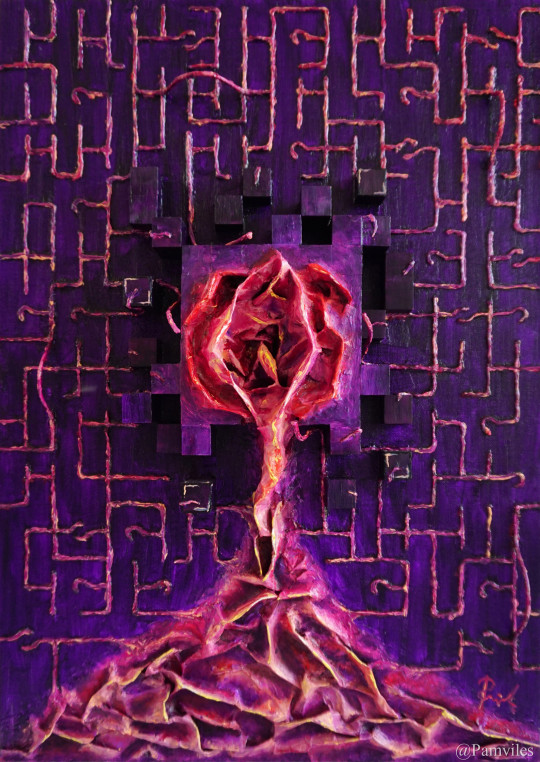
My artworks that conceal the information in the form of codes symbolize the process of constructing this lie of art.
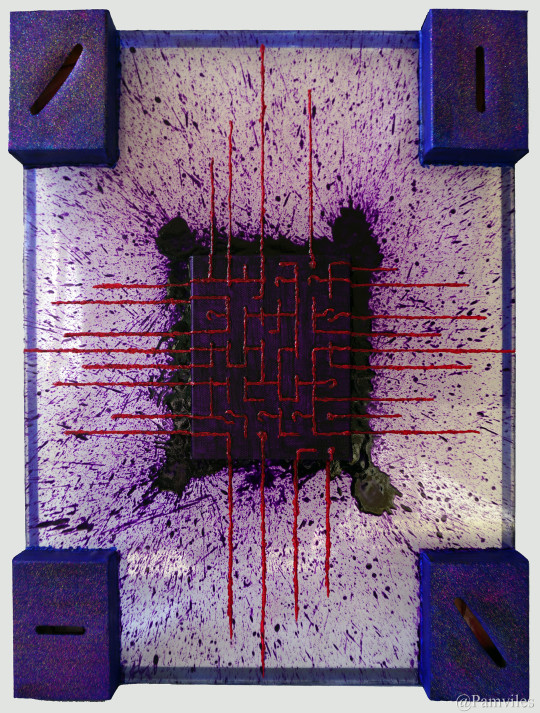
3. The Mirror of Math
Mathematics is a law that exists in all things in the universe. It exists at the beginning of everything, and will exist until the end of time. It is a pure world that can be independent of the physical world. It is not swayed by any biological or physical events, but at the same time it is the basis of the law of everything physical. Mathematics can exist beyond time, and is the only thing that never changes. In the modern society, it is also the basis of today's technological progress and represents the glory of our times.
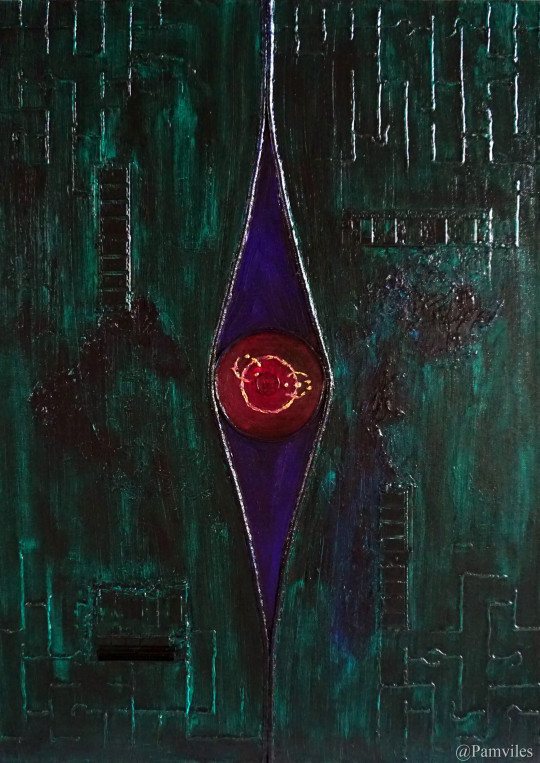
In my work, as the elements of mathematics have been embedded, the eternal side of mathematics is introduced. In the form of cryptography, the data and information in science and technology is given a contemporary aspect, representing the development of the modern world and the possibilities of the future. This is also expressed in some of my paintings. They depict not only a current state of time, but also a trend or possibility into the future. Nowadays, humans have created all the glory in technology, but perhaps in the near future, with the development of AI, technology would have promoted the evolution of humanity itself or even more radical changes, as the intelligent life form that existed at that time, what would they think about the origin and pursuit of the human beings that existed and their own?
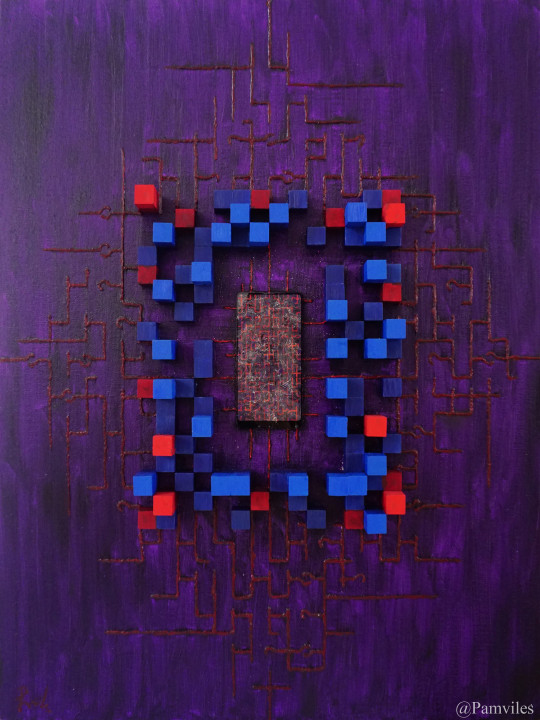
For me, the creation of the codes is an attachment to the conservation laws of all things in the universe. When I see various lines or different shapes in a picture, it is like seeing a series of random numbers. I always want to find the pattern in this chaos that explains it and gives it a sense of meaning in a regular form of order. And in our lives, aren’t they similar? Both spiritual and material pursuits give us a meaning in life, and maintain its continuation through inherent laws such as a stable social system, morals, etc.

In addition to the code with the sense of order in my artworks, it is also accompanied by elements of randomness, and this reflects the events or emotions in our lives that are unpredictable or controlled.

So in a way, my work is not only like a cryptographic map with hidden information, but also a microcosm of life and a world in the form of symbols.
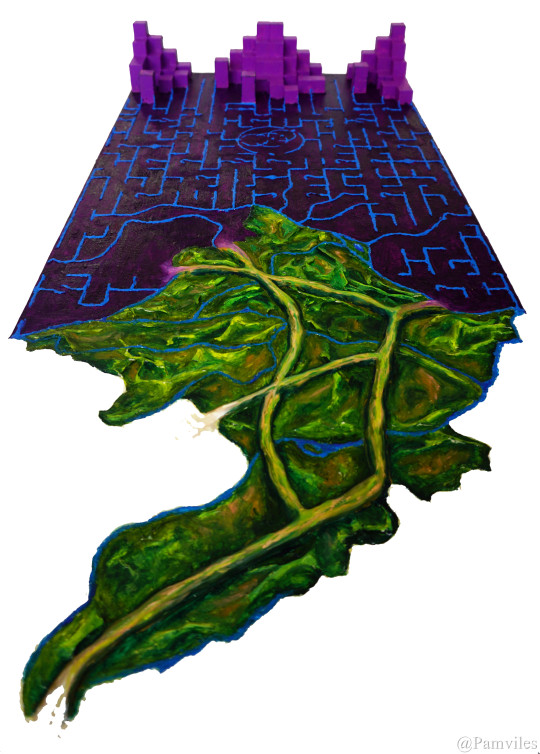
Therefore, when I use the math to create different code systems for my art creation, I am attempting to construct a completely new world in its purest form, a mathematical form mirrored by the physical world that we live in. In this new world, there is no trace of tangible living things. Instead, exist abstract expressions of feeling and reason, and the merging and struggles between them. Within these artworks, the use of code symbolizes the constant laws of our physical world and the various inherent methods of comprehending our reality.
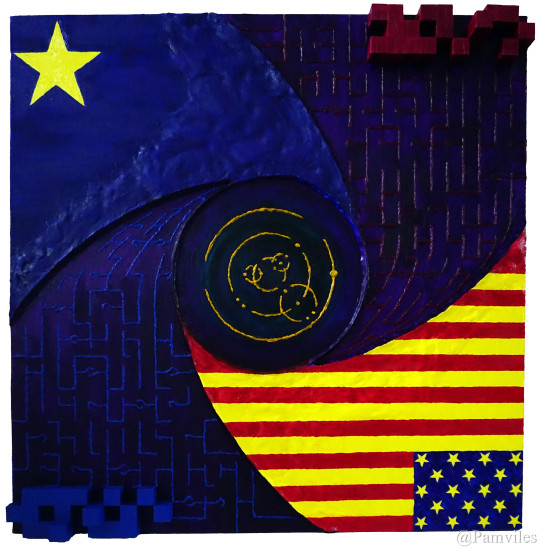
Ⅳ Overview
Codism is the product of the collision between math and art. It has a very characteristic symbolic meaning in the performance of art, and organically integrates related elements such as written word and communication, math and logic, data and information and various other concepts into art. The emergence of codism will hopefully add a different movement in art history.

First draft: 2019.12.31
3 notes
·
View notes